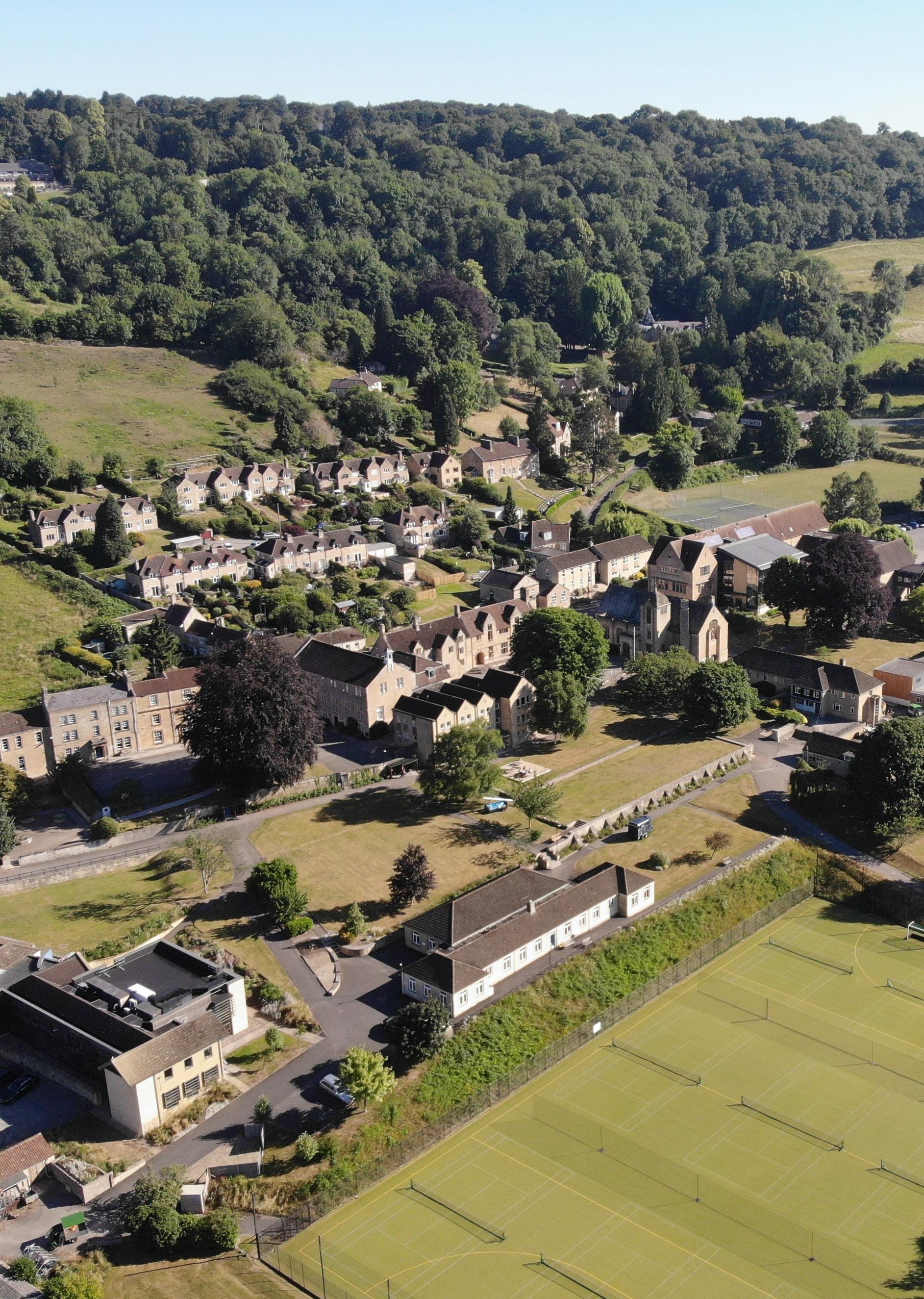YEAR 10 ENTRY MONKTON SENIOR
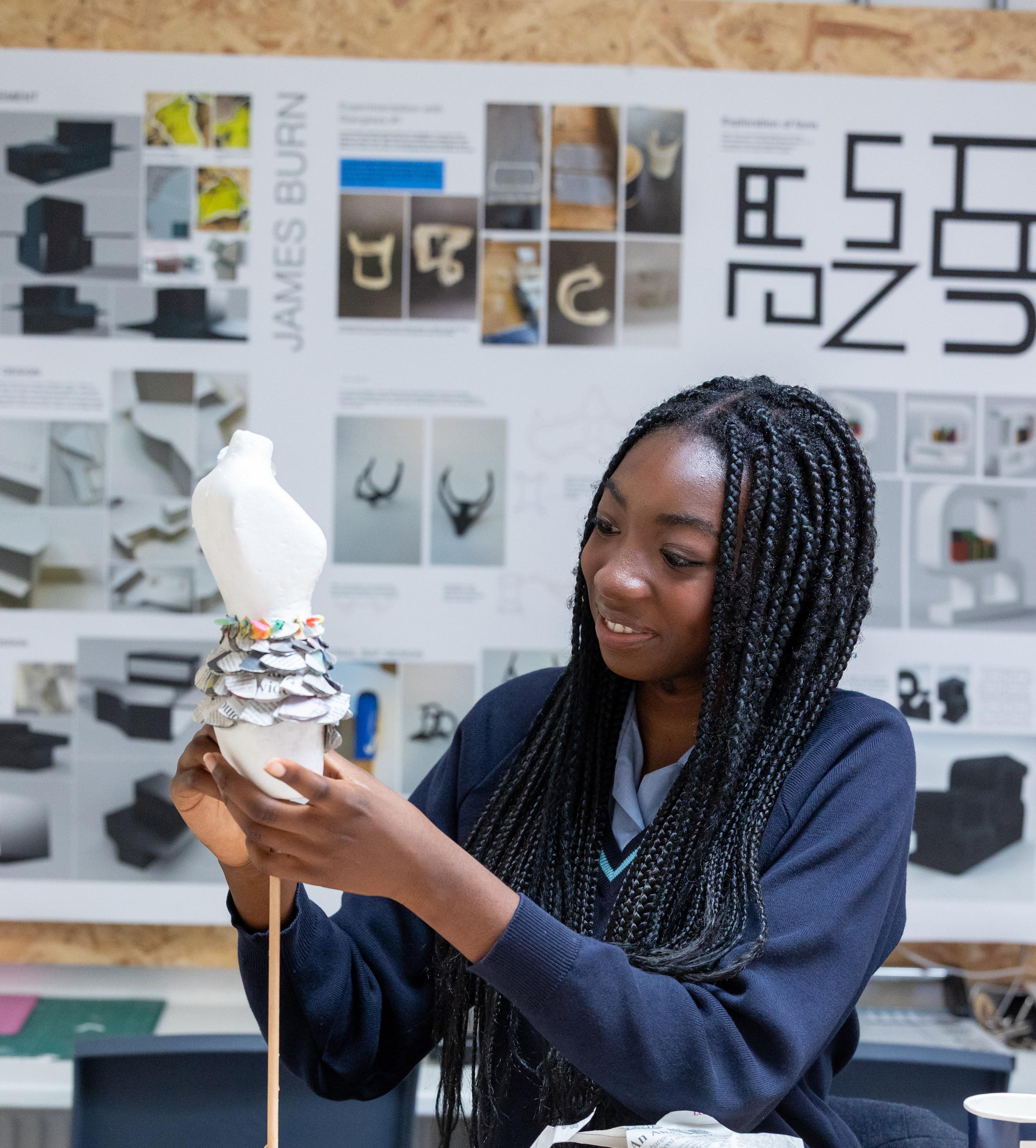

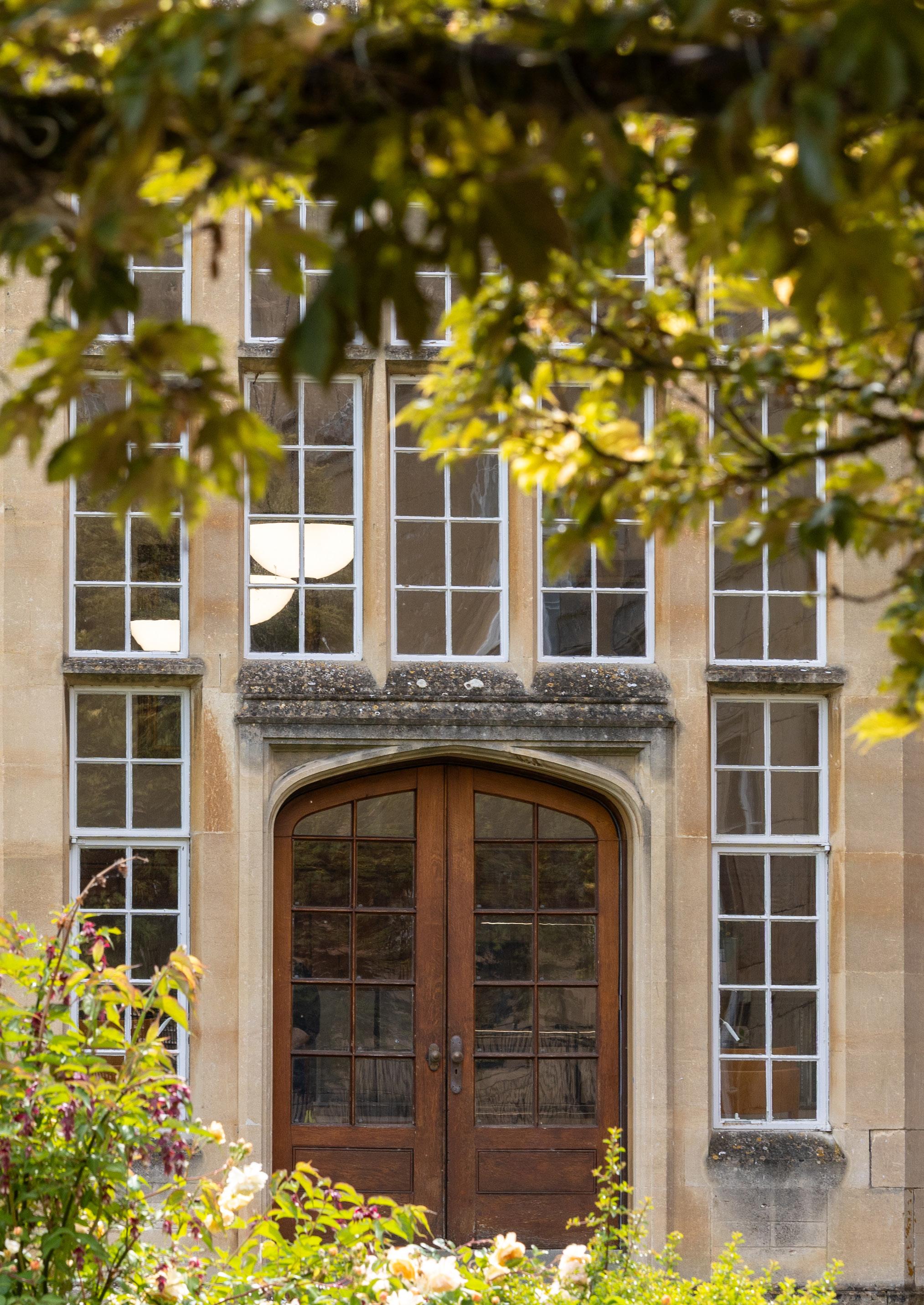




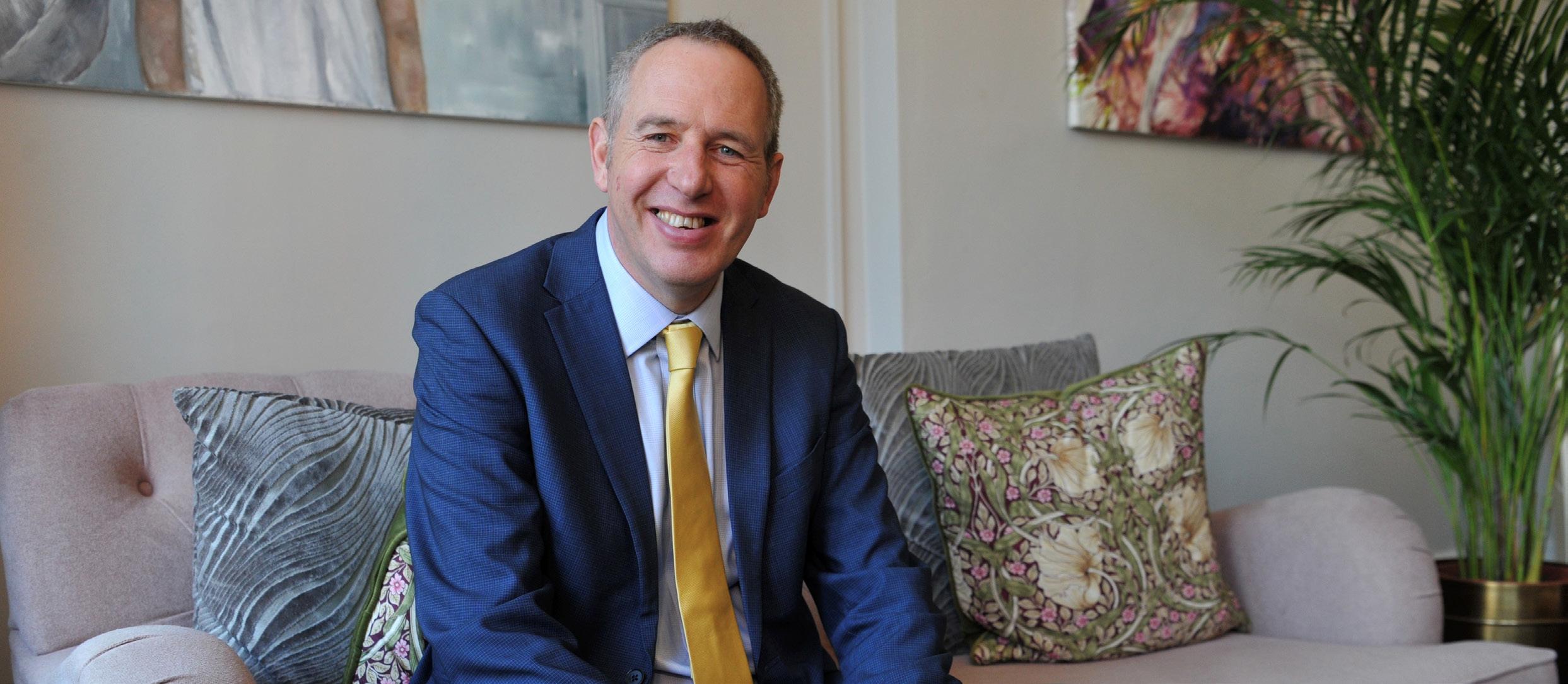
Years 10 and 11 are often dominated by the name of the examinations that take place in May and June at the end of the second year, GCSEs. For Monktonians, this is not all that these years are for. There is certainly a strong element that is focused on enabling each person to make a first inscription on their academic CVs. A series of marks that paint a positive picture about the level reached at this point in time. Monkton’s aim is to do all we can to enable this “front stage” to be both accurate and eye-catching for future recipients. This starts by helping pupils to make informed choices about their subject choices and then continuing to raise the bar over the two years with that final destination in mind. Pupils will need to become adept at receiving constructive and critical feedback, understanding how they learn and what works well, celebrating the small wins, collaborating with others and working hard. These two years are not just about the “front stage”, perhaps the greatest life-long learning takes place
behind the scenes, on the “back stage”. This is where pupils form their character, moral code and self-awareness. This is a priority for Monkton as we recognise that a focus on short term exam success will likely only deliver just that, short term exam success. “Back stage” learning happens when pupils take a broad view of how they seek to be known, where they seek inspiration and the growth that comes from being ambitious for yourself and others. The “front stage” GCSE grades will help open doors whilst the quality of the “back stage” will lead to a full life.
This booklet sets out the information you need to know about how the provision and choices for Year and 11 pupils at Monkton. If you have any questions, please reach out to a member of staff at the school. We would love to have that conversation with you. Years 10 and 11 are dynamic and exciting years and key steps into the Sixth Form at Monkton. I hope that what has been provided for you here gives a taste of that.
Perhaps the greatest life-long learning takes place behind the scenes. “
Bradley Salisbury Principal
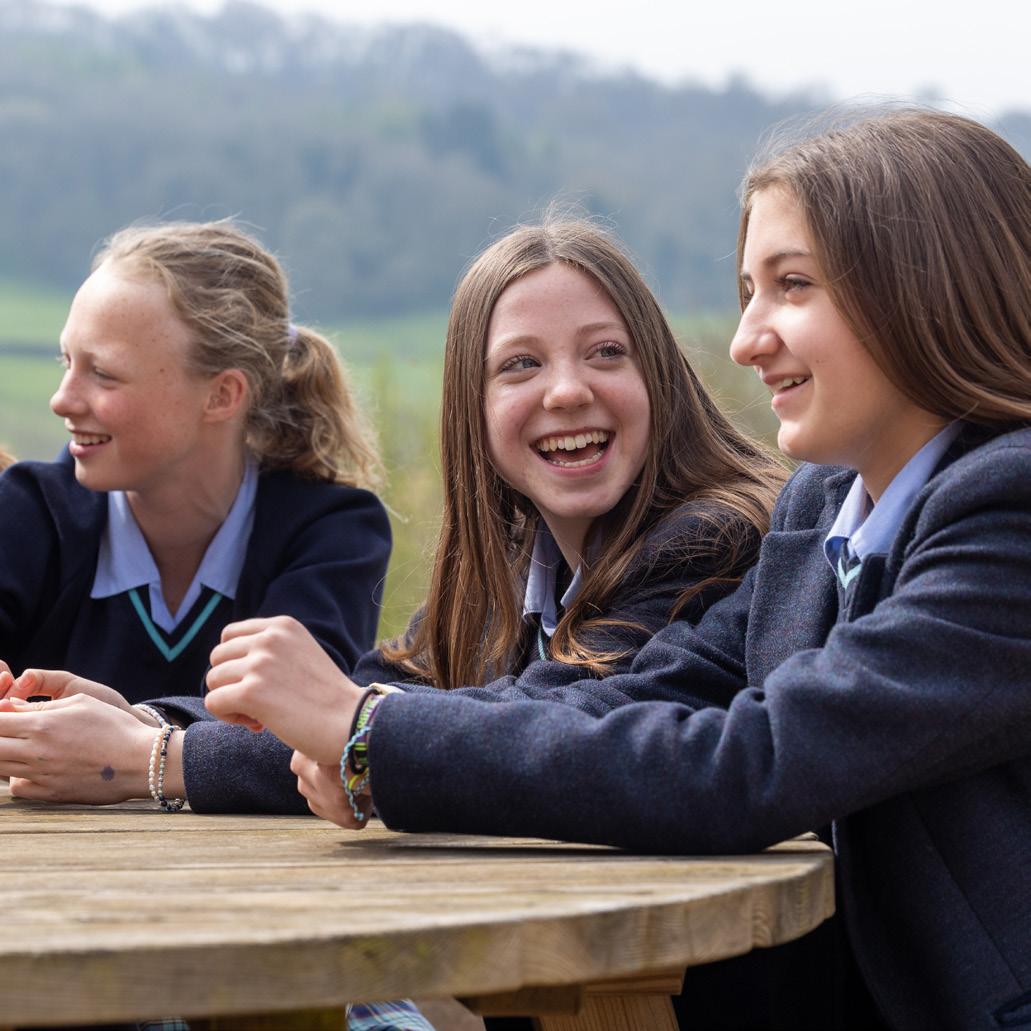
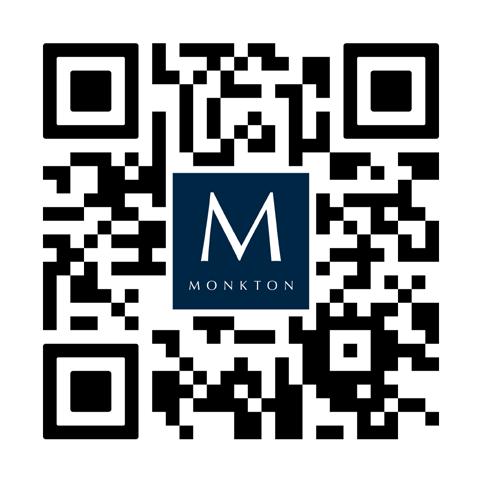
Scan the QR above to learn more about why parents chose Monkton!
Monkton is a very special place, full of opportunity, challenge and stretch, underpinned by a deep community that builds confidence and academic ambition. A place where you will…
Year 10 marks the beginning of a journey in more ways than one. GCSE work begins but this also marks a shift from exploring to honing, as you begin to focus on specific areas that you want to understand more profoundly. Your self-awareness grows and, with the help of the teachers, house team and tutor, who build deep relationships with you, you will start to see the path you want to pursue into sixth form, and indeed, beyond Monkton.
From the staggeringly beautiful surroundings of the Monkton valley to the innovative, stretching academic curriculum, to the breadth and excellence of the cocurricular programme, to the deep communities in the houses - everything is here to inspire you to learn, to start to imagine what you want to do in the future, with so much to enjoy in the present.
We want our pupils to be ambitious in so many ways: academically, ambitious to be the best version of themselves, to be brave to push themselves to learn new things, persist through obstacles, to find a future path that they believe in and to have the confidence to pursue it. There are as many futures as there are Monktonians, but at Monkton you will find all you need to grow into a courageous, kind adult, able to make a positive difference to the world both now and in the future.
Read on to find out more…
Community
Boarding
Christian Ethos

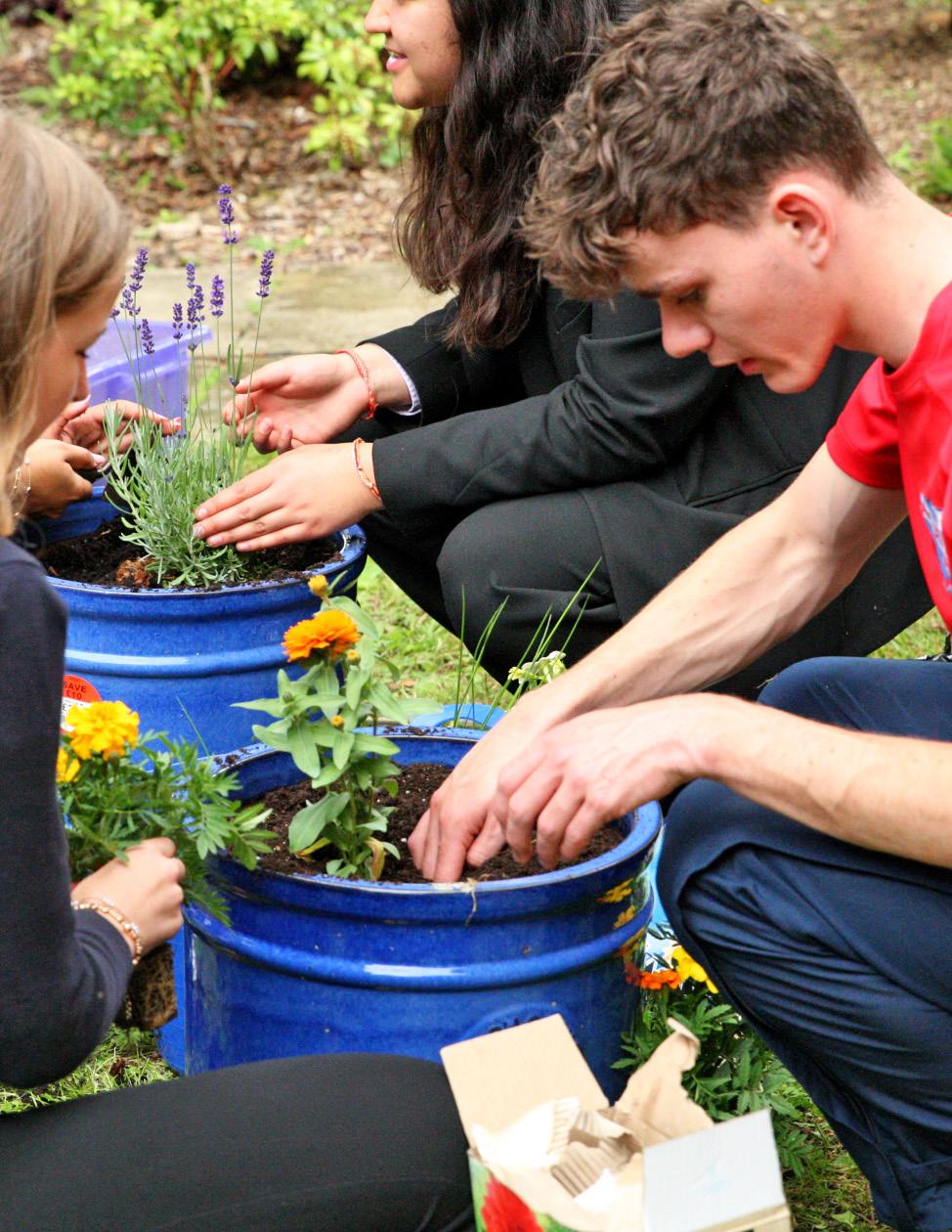
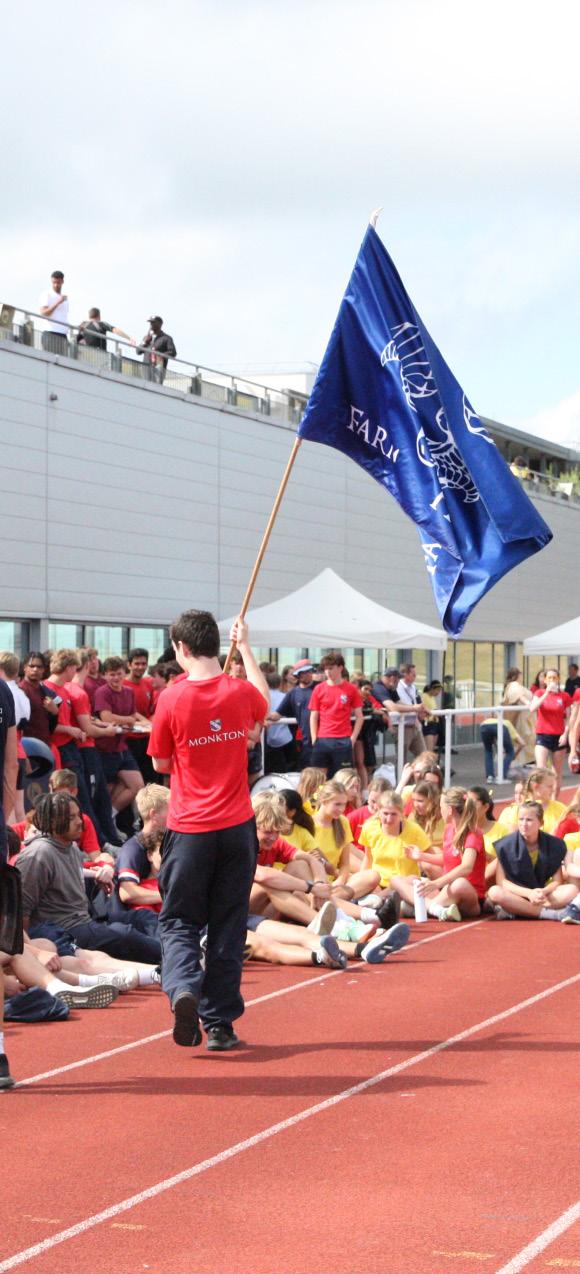
The truly special community is one of the things that sets Monkton apart and is an aspect that is deeply valued by so many pupils, past and present.
We have a distinctive, blended approach to boarding, with all pupils, day and boarders being integrated in the houses and the opportunities for day pupils to engage with the evening and weekend programme. This enables every pupil to be known by teachers in a deep and nuanced way, creating a place where it is safe to try, to step out of your comfort zone and push yourself.
And the community extends in both directions, in all sorts of ways. Across the cocurricular programme you will get to know a variety of people, from your year group and beyond. The boarding ethos enables you to forge connections, not only with your peers, but the older pupils as well. They become like older brothers and sisters, giving advice, support and care, and those friendships often outlast school.
Kindness and care for others sits at the very heart of how we operate as a school and community. They make Monkton a very special place to live and study.
The supportive and accepting community at Monkton enables student to push boundaries and explore new skills. “
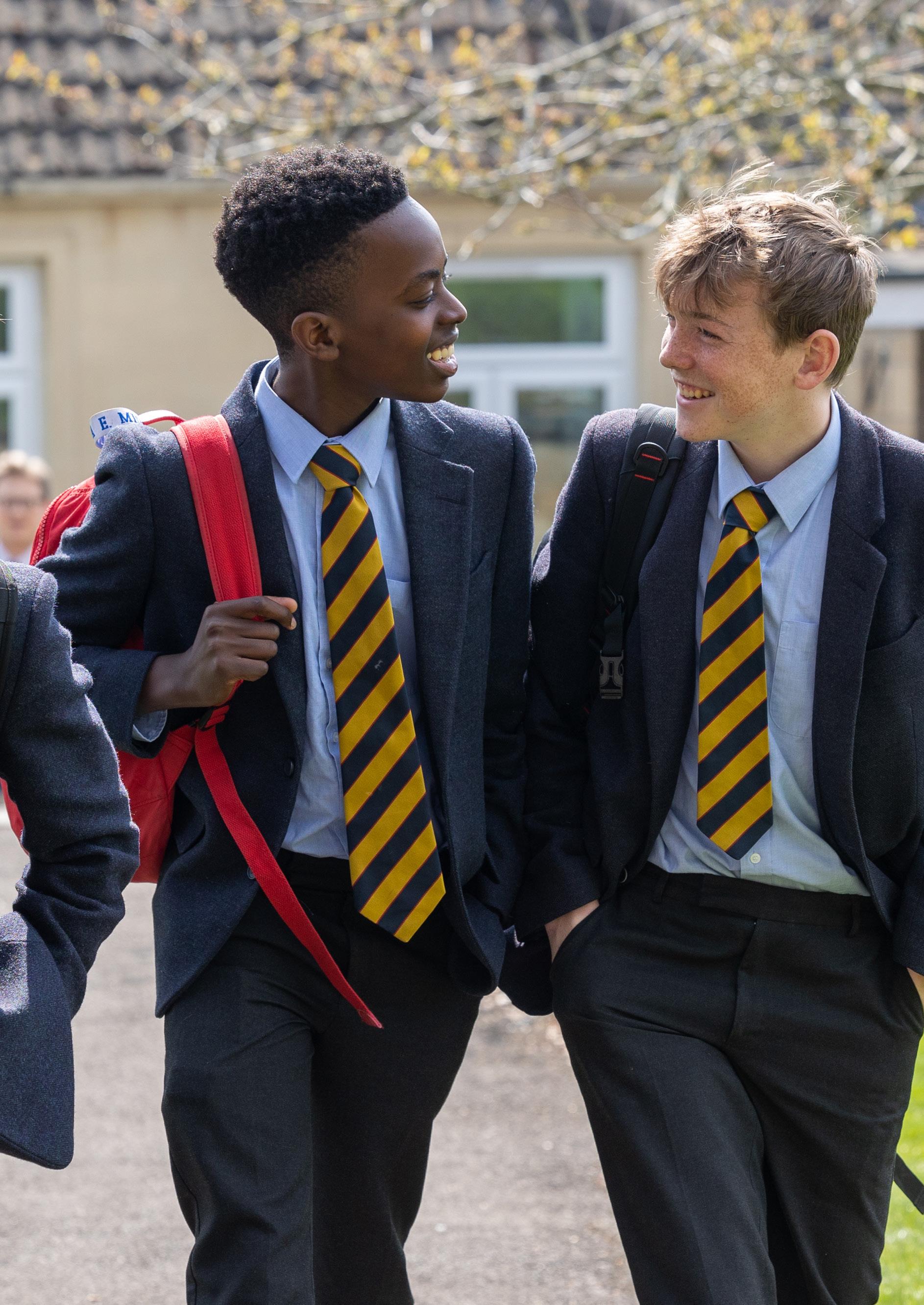
A key aspect of Monkton is our boarding ethos. The school day is built around this and allows time for students to build strong relationships and memories which in turn enhance their experience of school life. The boarding environment encourages students to learn more about others and, in doing so, about themselves.
Living in a strong and caring community, where older pupils pride themselves on supporting younger ones, those starting their time at the Senior School quickly feel safe and at home. They are able to see in older peers some of what lies ahead for them and aspirations and character are developed in a positive environment that encourages individual discovery.
All students (both boarders and day) join one of the six boarding houses which are led by Houseparents and their teams. Houses are full of life and laughter throughout the year and the care and systems in place from staff and students alike help build independence within a loving big family.
Day pupils are entitled to spend a number of boarding nights at Monkton without extra charge (subject to the availability of beds) each academic year to help them in their ‘journey into boarding’ that ultimately all students are on as they move towards adulthood.
I found that the house community doesn’t change, whether you’re boarding or not. I often came in for breakfast and didn’t leave until just before bedtime. This was one of my favourite parts about Monkton- which I’ve found to be quite unique after talking to my university friend “
Izzy Class of 2020

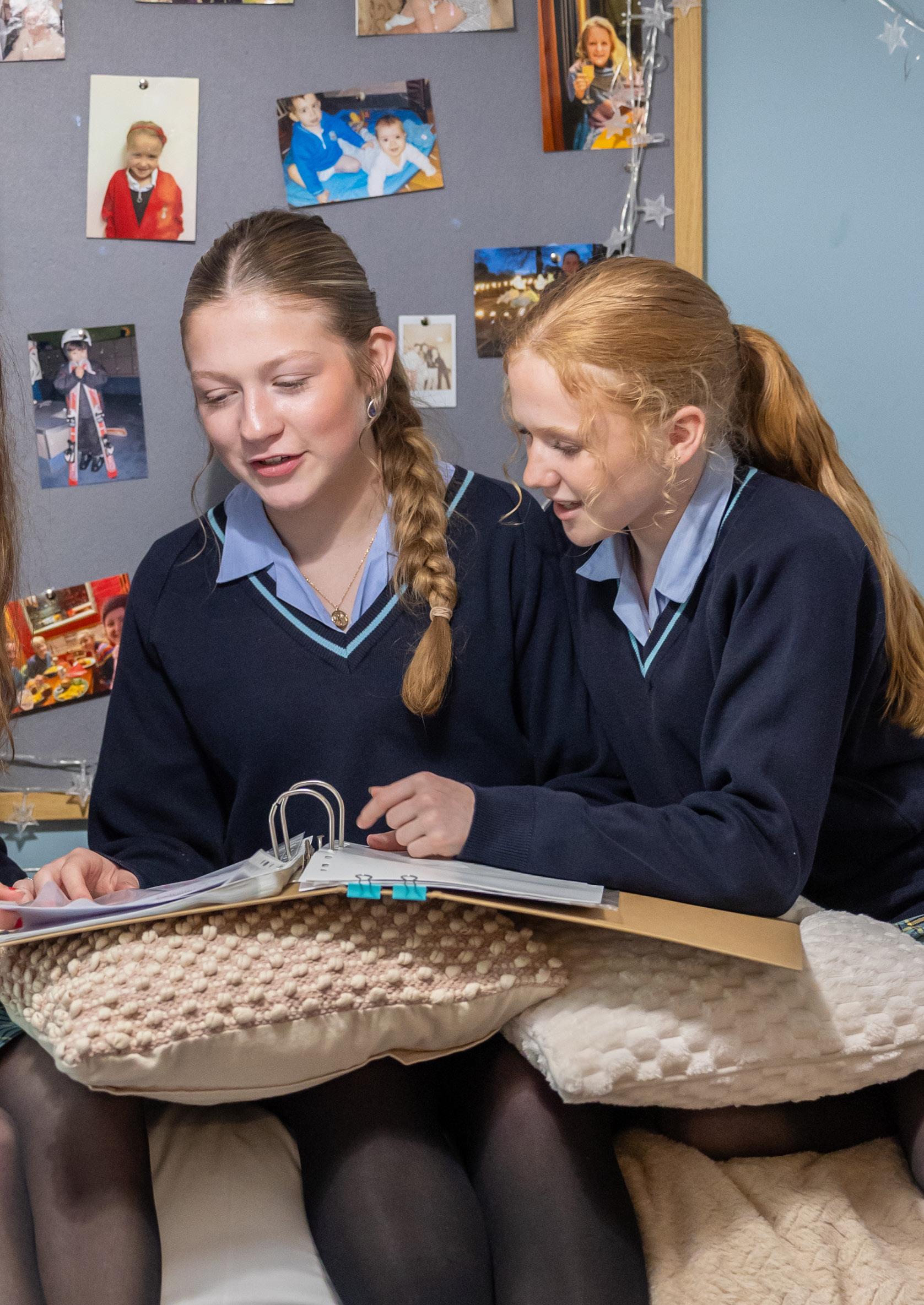
Monkton’s Christian ethos lies at the heart of the school in the values it helps nurture and the opportunity it provides to explore faith as well as the bigger questions of life. The School meets centrally for a short chapel service and Thought for the Day on Mondays and Wednesdays, led by the Chaplaincy team, members of staff, and pupils. On Fridays, each House holds its own House Prayers—a house-led, informal and interactive chapel. The School gathers for a longer chapel service on Saturdays after lessons, and before lunch and afternoon sports begin. Visiting speakers, a range of topics, and multimedia are all used. For boarders wishing to attend a church in Bath on Sundays, minibuses and taxis are provided.
In addition, there are optional Bible study groups on Monday evenings, run by various members of staff, which are well attended. The highlight of the week
“
I on the CU committee, which was so encouraging for me and was an opportunity to serve and help others. I was also mentored by Rev Hutch who read the Bible with me and helped me grow in my faith.
Peter, - Class of 2023 Christian Bursary Recipient
is the Christian Union, meeting on Wednesdays and attended by around 80 pupils. The Christian Union is organised and run by a Year 13 committee, supported by the Chaplaincy, while a number of Sixth Formers also lead year-group or house prayer groups.
Alongside this, there is a lively programme of activities throughout the year, including sports events, joint gatherings with other schools, and visits from comedians, sportspeople, and rappers. During their time at Monkton, pupils are given the opportunity to engage with the Christian faith, explore their questions in a safe space, and see how a Christian framework for life can be lived out practically as they prepare for life beyond school.
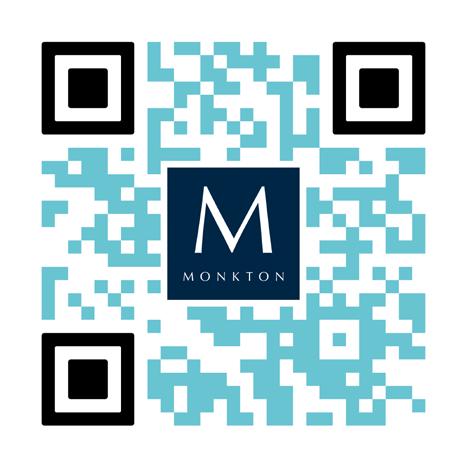
Scan
the QR above to learn more about our amazing Chaplaincy
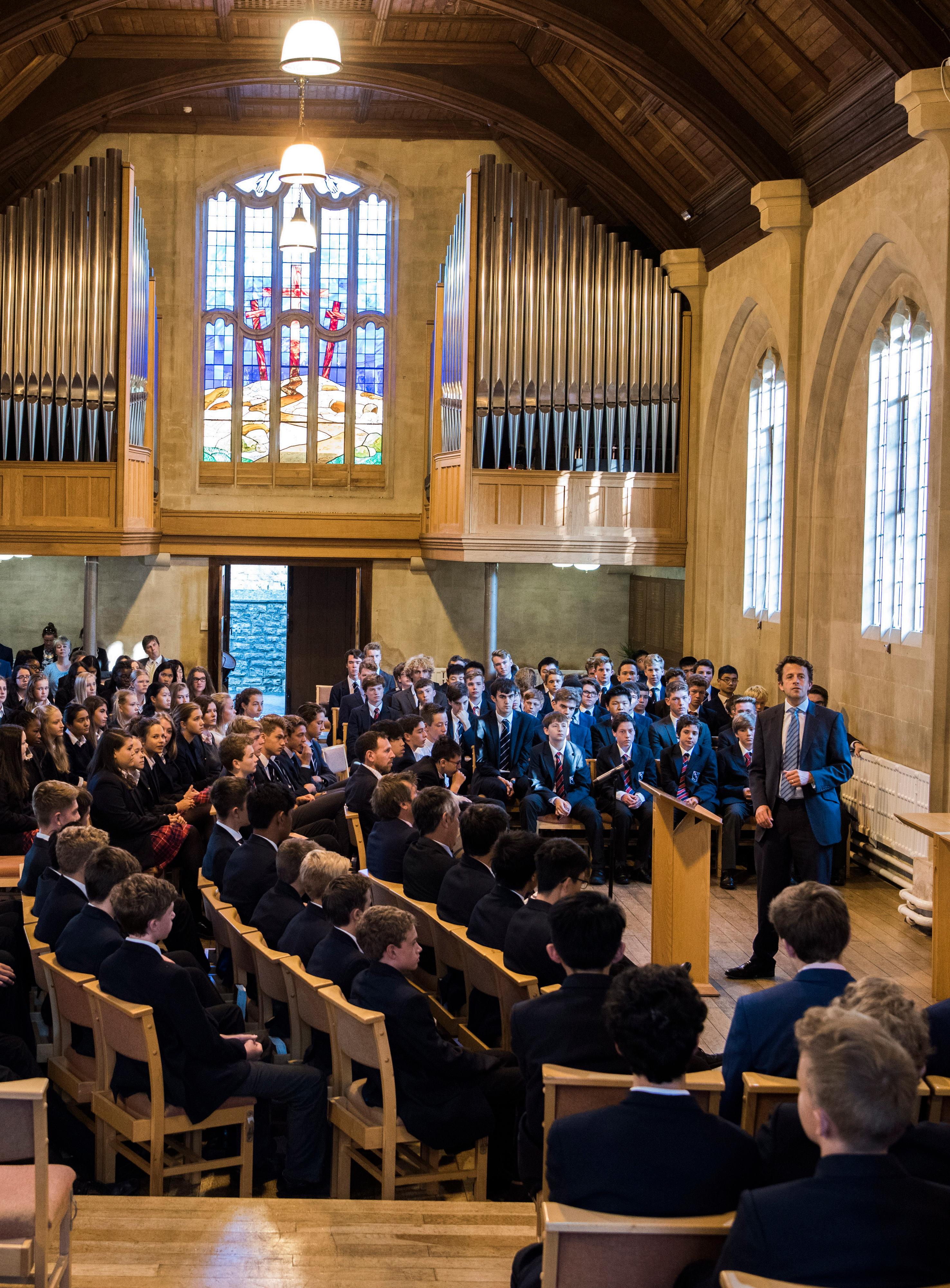
Monkton’s Christian ethos is such a core part of the school and totally shapes the foundations and attitudes. Compassion always comes first, creating a loving and safe community, without fear of judgement and with certainty of support.

Scan the QR above to learn more about our co-curricular provision

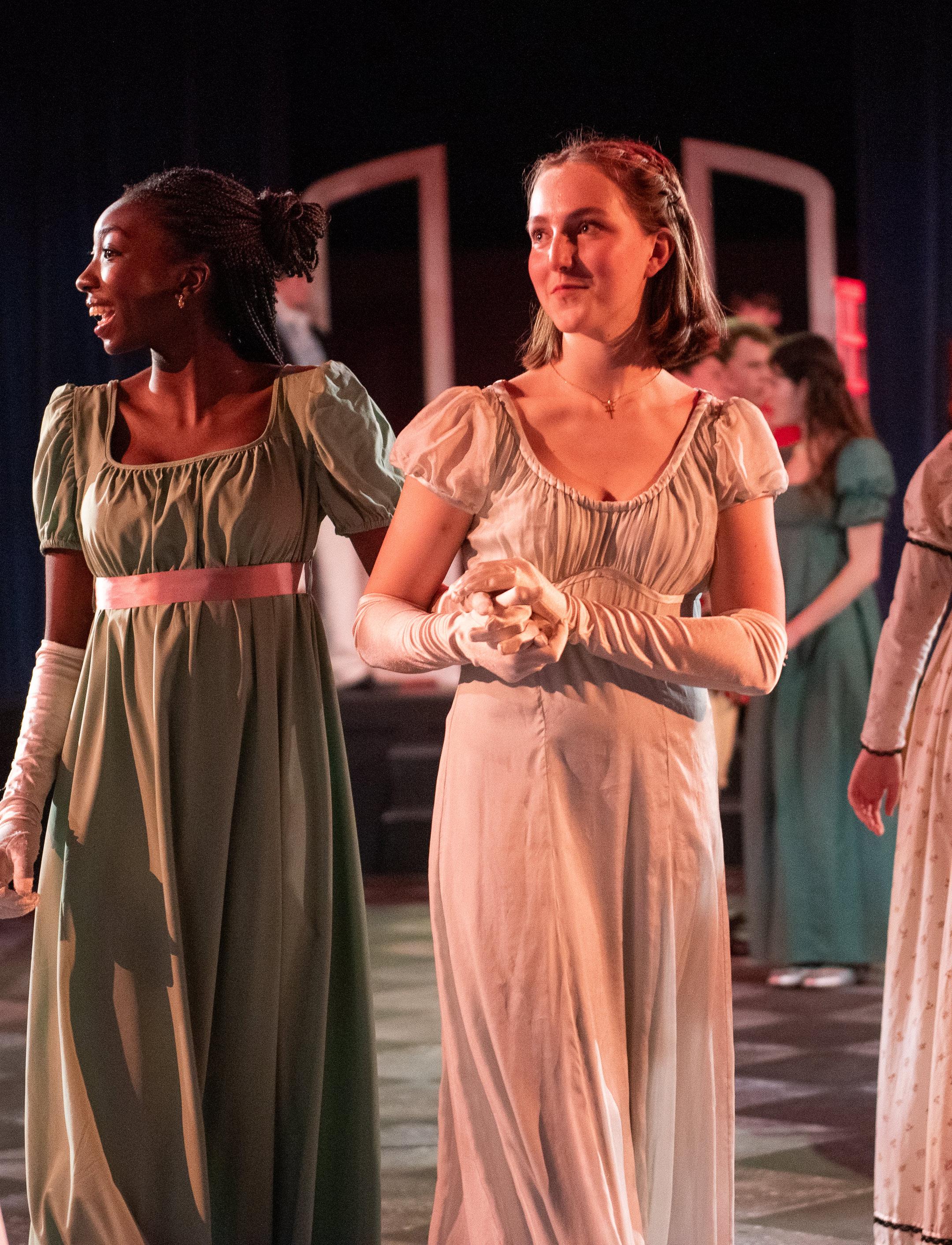
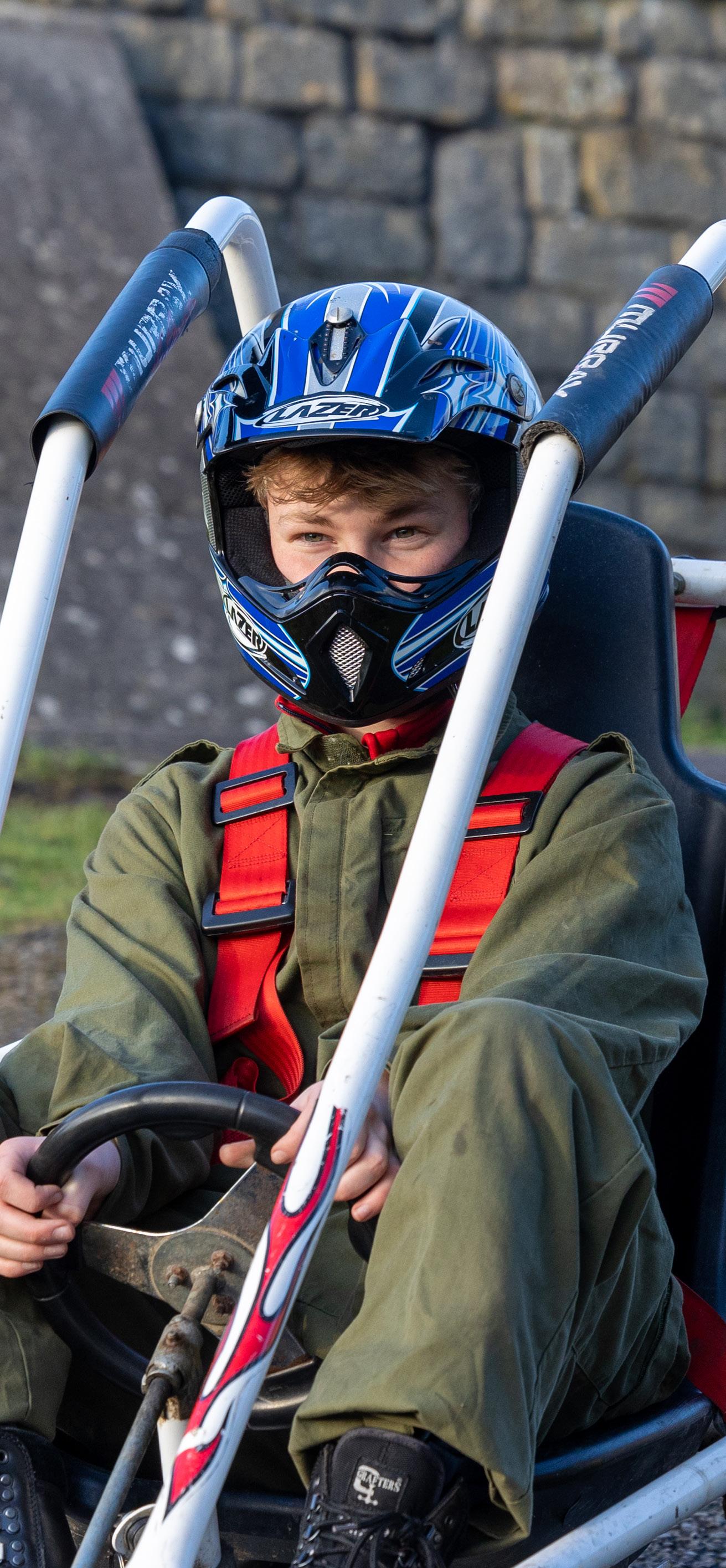
In Year 10, there are a wealth of opportunities on offer outside the classroom. But it’s not just about having lots on offer, it’s about how every pupil is individually supported to get involved, be inspired through trying new things, and grow through those experiences.
Co-curricular life isn’t a ‘bolt-on’ at Monkton - it is central to helping develop the whole student. So much growth happens outside the classroom as pupils learn how to lead, how to collaborate and how to bounce back when things go wrong and these are all skills they will take with them after school.
School clubs are wide and varied and students are often able to introduce their own, with staff support. They include product disassembly, retro games, gardening, bee keeping, airfix models, knitting, craft, chess, philosophy and walking.
Year 10s also choose one strand of Combined Cadet Force: Army, Navy or RAF and discover a wide range of experiences and skills.
“
I really valued how Monkton encouraged me to take part in every aspect of school life, from sports to drama to academics, helping us grow into well-rounded individuals. The community at Monkton is so unique and I am so grateful I was a part of it.
Tasha
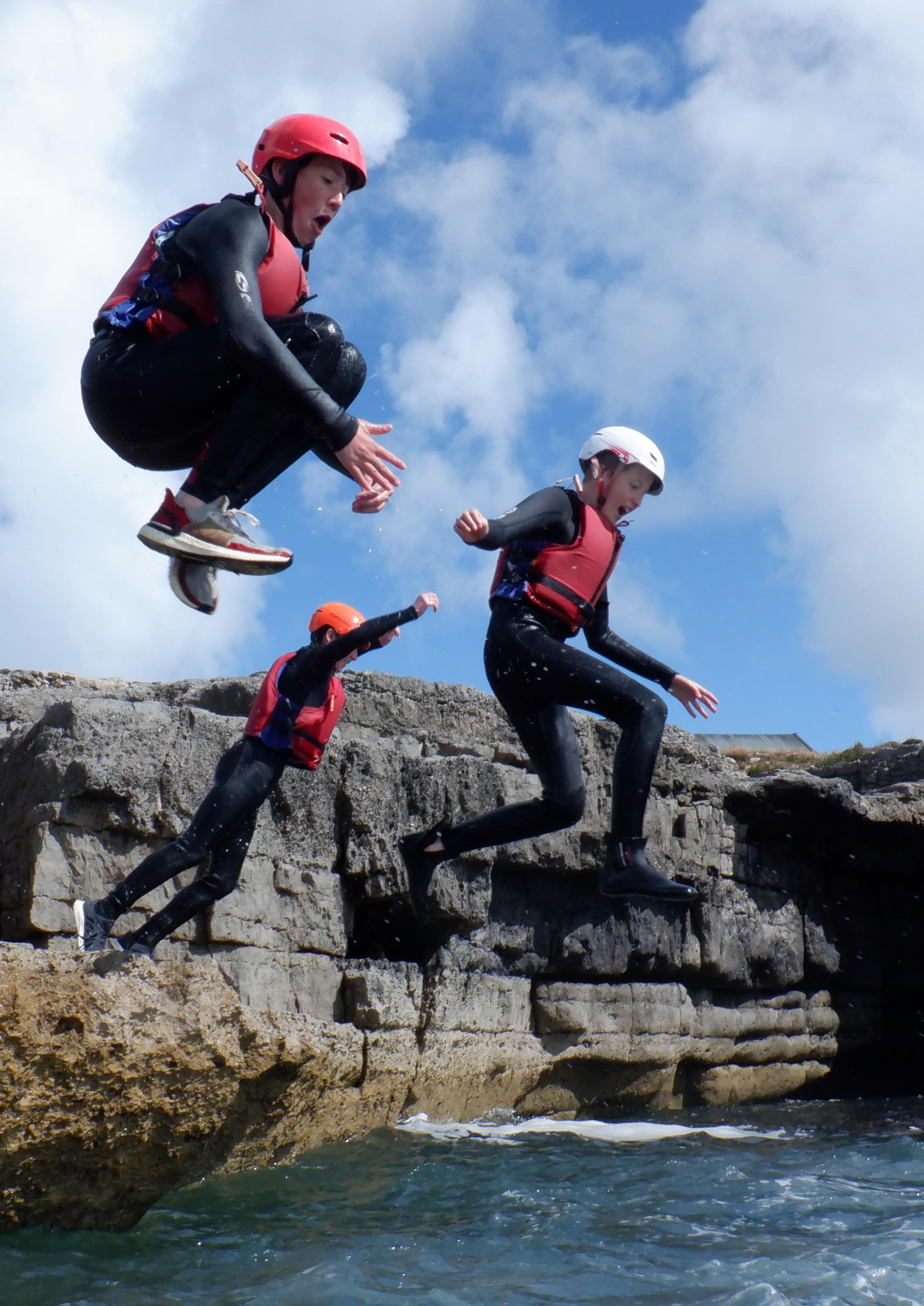
All Year 10 have 2 sports sessions during the week. These vary from tetwom to term, but include rugby, hockey, netball, cricket, rowing, tennis and athletics. There are also Saturday afternoon fixtures most weekends, and often the whole of Year 10 will be involved in these. These sports are run by highly qualified Heads of Sport and coaches both from the staff body but also from local clubs such as Bath Rugby and Bath Buccaneers Hockey Club.
There are many sports clubs that Year 9s can choose to take part in. These include: Ultimate frisbee, basketball, football, table tennis, stretch and tone, pickleball, running and touch rugby.
There are also extension sessions for the main sports for those wanting to develop and improve their skill levels further.
Monkton has supported me by providing me with opportunities to be coached by highly skilled staff who constantly motivate me to improve. This has led me to be able to compete in events such as Henley Royal Regatta. “ Noah Class of 2025
Some students make the most of our links with Bath University which is 10 minutes away from school. There are regular minibuses from school so students can participate in the various clubs and regional development sides, including Bath Buccaneers hockey, Team Bath swimming, Team Bath netball and Bath Athletics club.
When students reach the highest level of sport such as international representation, they have bespoke arrangements to ensure they are able to balance the demands of their high performance sport and their academic studies.
“
The sports department has shown how much they are committed to making sure each child can improve their physical health. Even when you’re not in the top teams, you do feel like you’re working towards your own goals.
Manuella Class of 2020
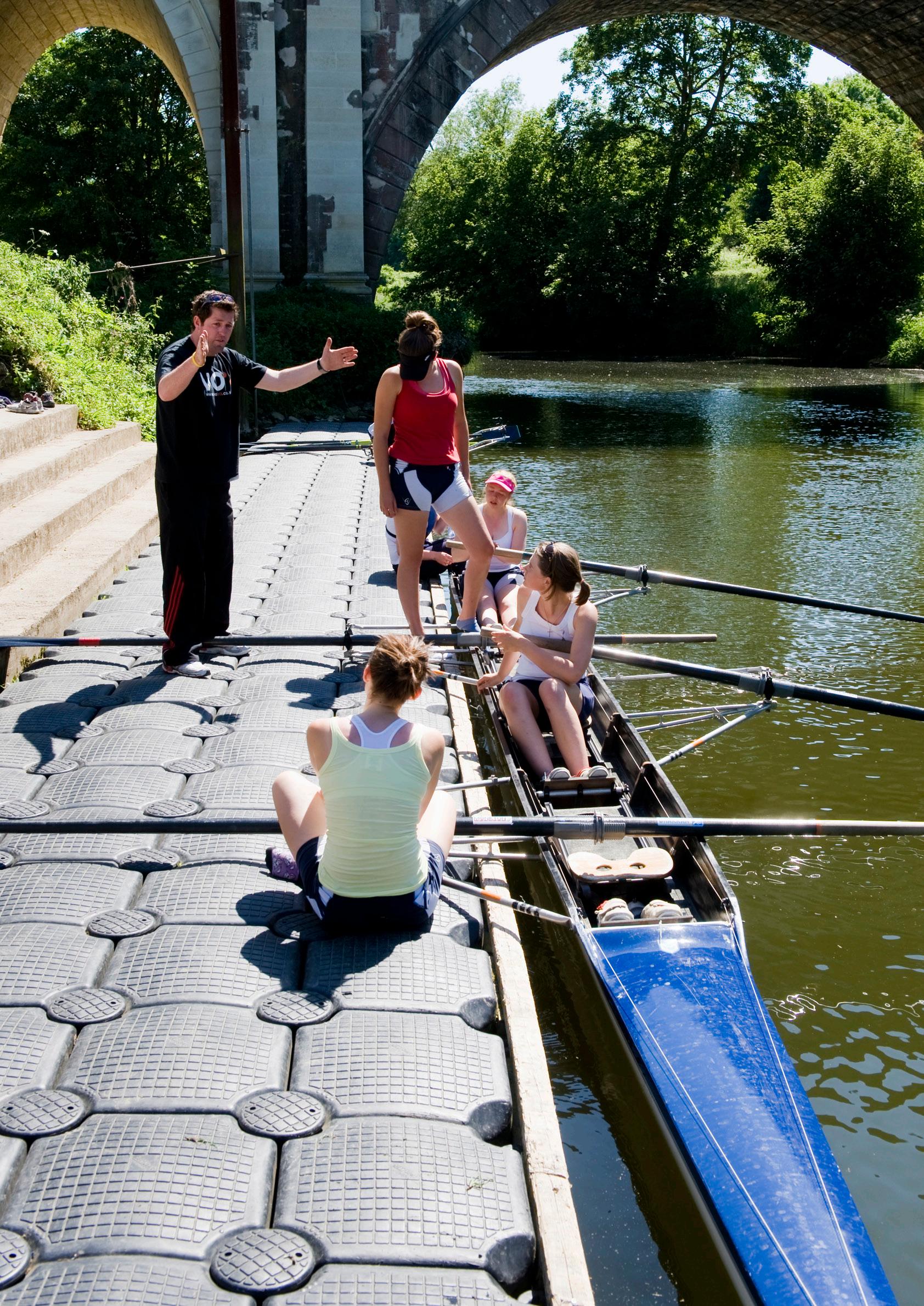
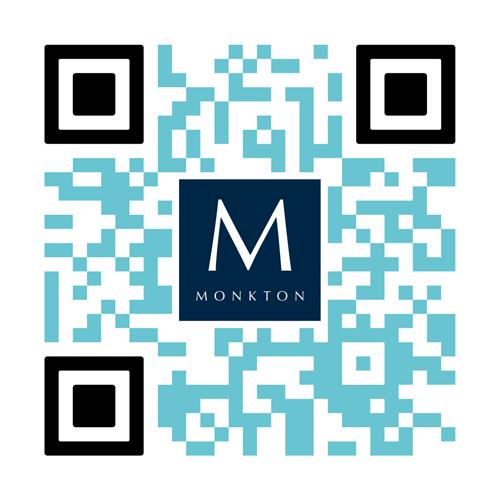
Encompassing Drama, Music, Dance and Media, there’s a place at Monkton for everyone to experience the joy of the Performing Arts. Opportunity is central to the faculty, which provides a broad range of creative and expressive possibilities. In Drama, outside of the classroom, we offer everything from informal pupilled solo events through to extravaganza productions such as Pride and Prejudice and Into the Woods. Innovation is at the heart of what we do, including a recent radio play performed live to an audience listening on bluetooth headphones, self-penned radio shorts recorded in our Radio Studio, and Monkton Touring Theatre which writes its own annual show for local schools. Whether it’s on the stage or backstage, there’s a place for all.
We have links with higher education establishments including Bath Spa University and the Royal Welsh College of Music and Drama, and recent visits to professional venues have included the superb postproduction Films@59 and a bespoke tour backstage at the Royal Opera House.
In Music, there are numerous opportunities to get involved. Ensembles include choirs, orchestras,
“
bands and many smaller groups, and there is a host of performance opportunities ranging from the amazing annual Longmead Music Festival on a Glastonburystyle stage through to Studio 1@1 informal lunchtime concerts, from Evensong at St Paul’s Cathedral and performances at Disneyland Paris to interactive concerts featuring live gaming! The faculty’s Media opportunities are also growing, offering weekly sessions in our superb studios, teaching audio recording for podcasts, and every faculty event is livestreamed, often in multi-camera format. In Dance, we have regular workshops from leading professionals from the West End.
As well as engendering a love of the arts and developing life skills such as creativity and selfconfidence, Monkton’s most passionate artists have gone on to study at a wide range of leading institutions from The Royal Welsh College of Music and Drama and LAMDA, to BIMM and Surrey University.
Monkton’s Faculty of Expressive Arts lives by its motto - Opportunities for Possibilities.
As an actor, I’ve discovered that true growth arises from stepping out of your comfort zone. Monkton’s Expressive Arts department encouraged me to rise to the challenge, and through that, I’ve become stronger and more confident in my craft.

Our unique Wild Monkton programme recognises the importance of being outdoors away from screens and close to nature in order to help support our students’ mental health.
The Clubs programme also offers many opportunities to get outdoors with clubs such as gardening and walking.
Along similar lines to the National Ten Tors Competition, our Year 10 students have the opportunity to complete our own challenging Monkton Mountain Challenge. This is open to those students who really want to push themselves physically, mentally and emotionally in the outdoors as they tackle an increasingly challenging set of mountain peaks in the Brecon Beacons, Dartmoor National Park and Snowdonia, with wild camping and cooking along the way.
The co-curricular programme inspires our pupils in so many ways, whether they are deepening an existing passion and learning to excel in it, or discovering a new skill and broadening their outlook as a result.
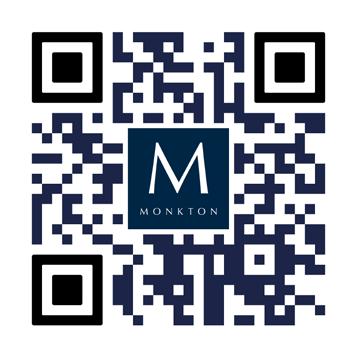
Scan the QR above to learn more about our Outdoor provision at Monkton
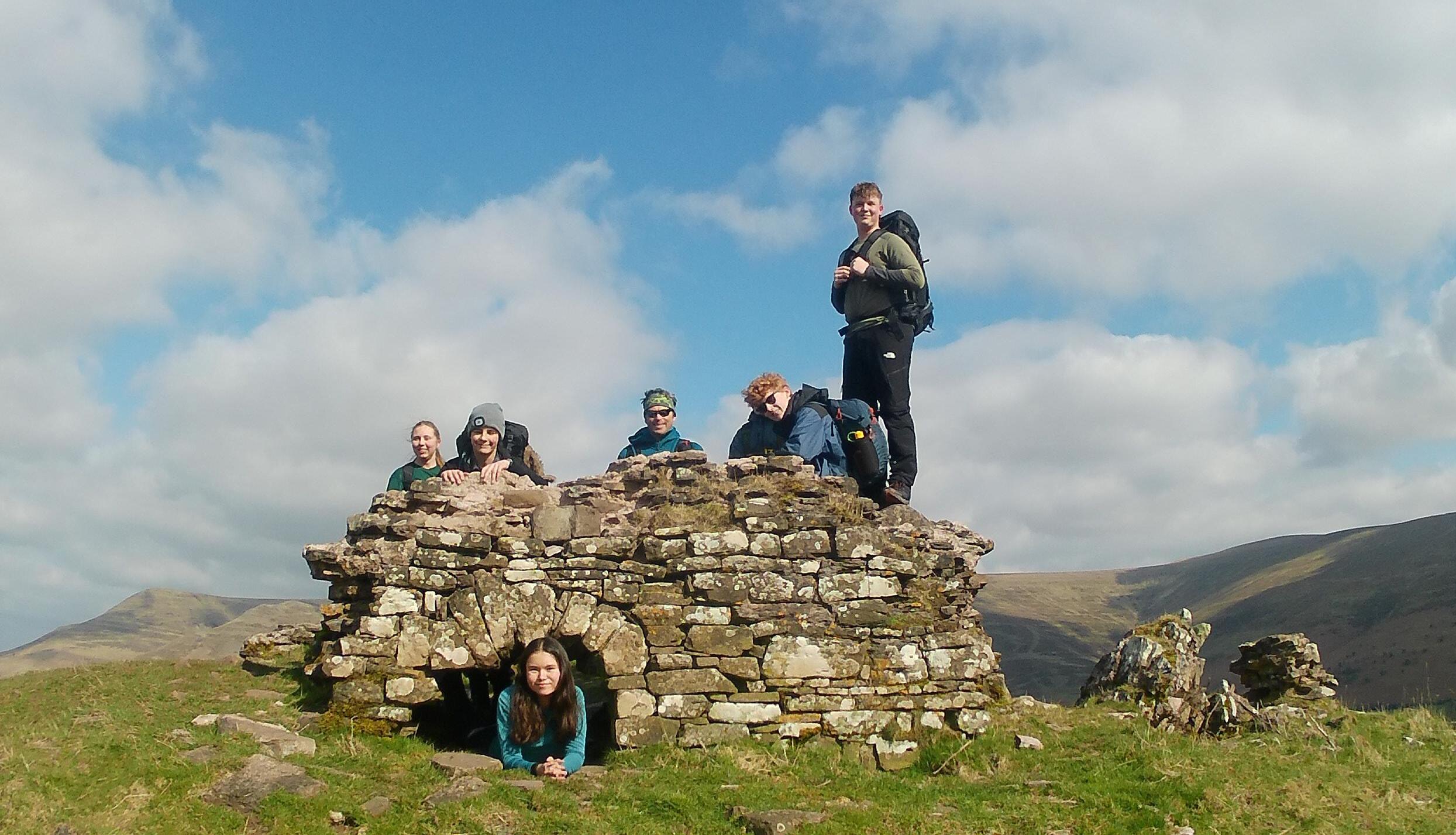
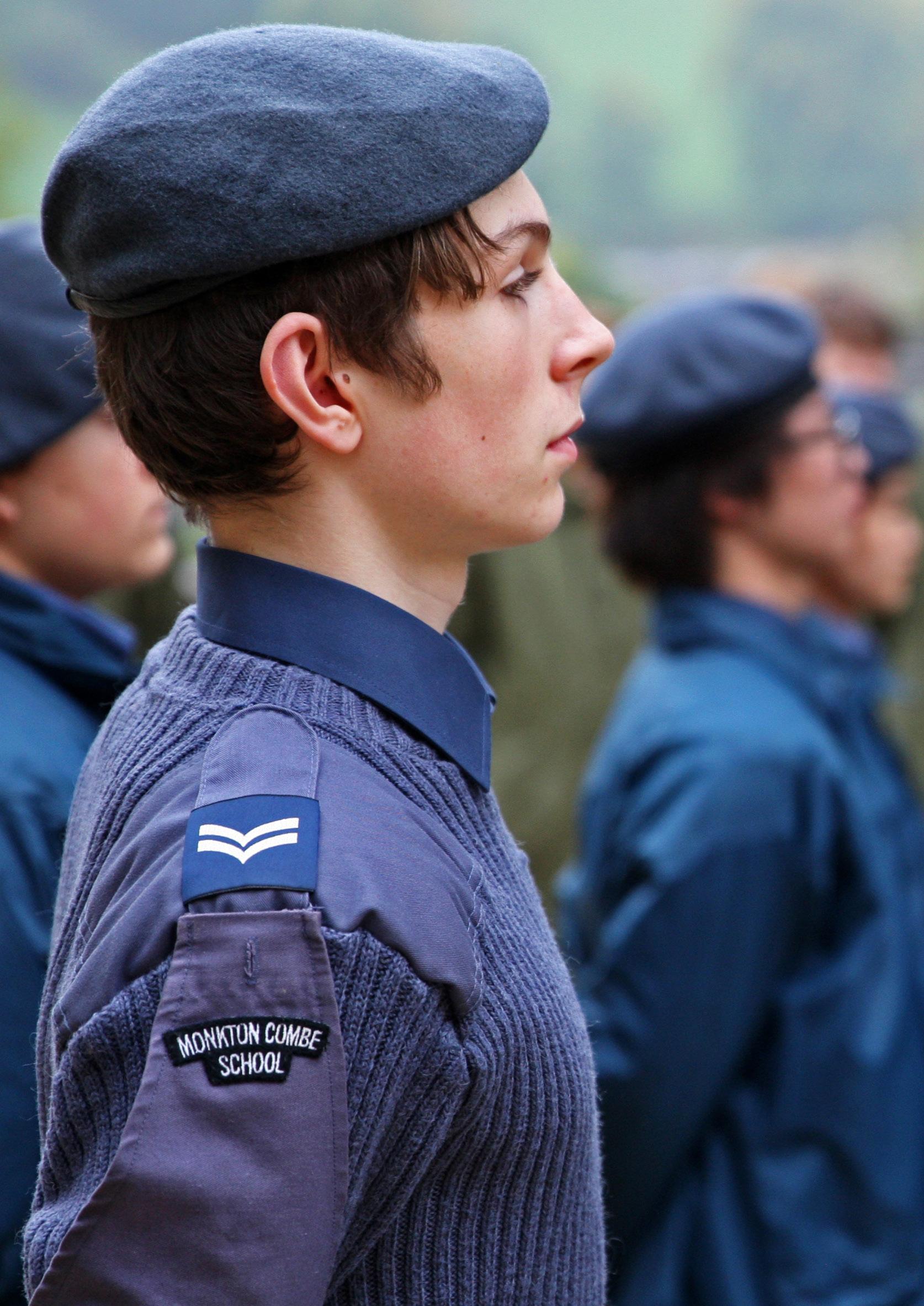
Our Combined Cadet Force is compulsory for all Year 10 students. Students choose between 3 sections - Army, Navy and the RAF. Here they learn field craft, navigation, team work, personal challenge, selfdiscipline, first aid, code breaking, communication, as well as flying and sailing on occasion.
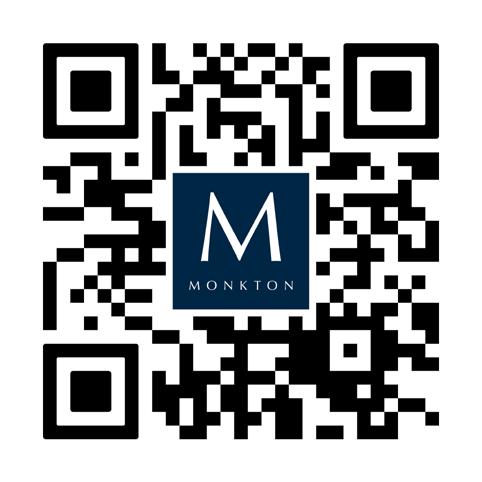
Scan the QR above to learn more about our academic provision
Futures
Destinations
Subject Curriculum
Scholarships & Bursaries
Academic Pathway Map
Admissions

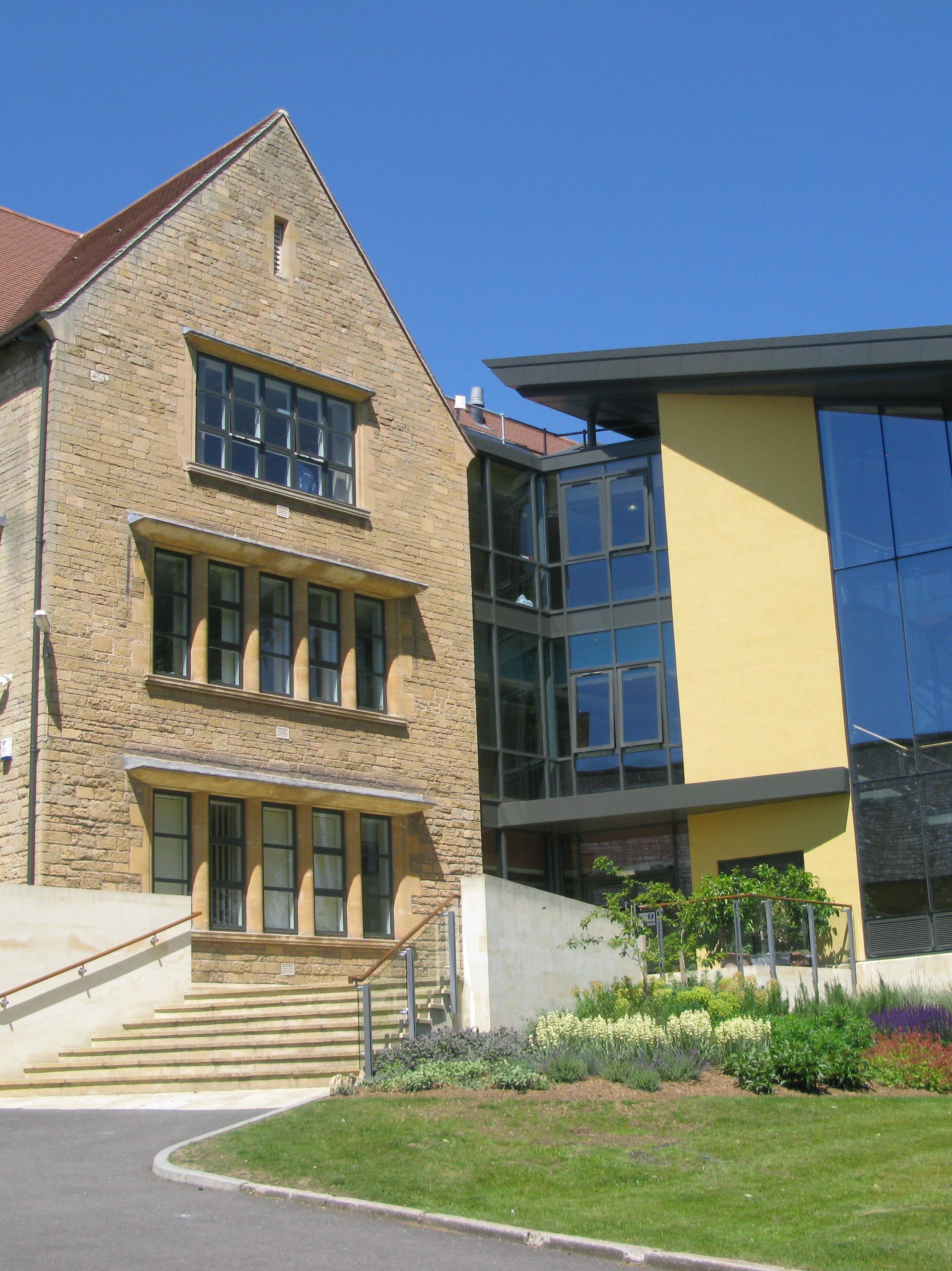
Monkton’s vision is to inspire young people to become courageous, kind and ambitious adults who live fulfilling lives.
Hence, our Futures Programme in Year 10 and 11 continues to build on each student’s careers journey so far. There is individual advice through our 1:1 Tutor meetings and also by arranging meetings with any member of the Futures Team. In addition, there are opportunities for external advice, and discussions the school’s senior leaders at key transitions.
Our Futures programme is about helping each student to become future ready and aware of their options. Students will develop an understanding of the world of work and labour market through careers specific lessons in their PSHE. Each student will continue to build on their personal online careers account as they progress through the school and this account acts as a central hub for the formalised careers testing in Year 9, 11 and 12.
One of Monkton’s key educational strategic aims is that we are a community with faith as its cornerstone committed to working together, developing self
knowledge, always asking questions, evaluating progress, acknowledging failure, celebrating success, and making implicitly taught skills and characteristics explicit. Therefore, students use their careers account to gather evidence of skills development and to record their research and thinking.
We use a variety of personality and strengths questionnaires in order to provide students with greater insight and understanding of themselves so they can become more self-aware. We also use the Skills Builder Universal Framework for Essential Skills to develop these core, transferable skills for employment through lessons and activities. We encourage students to produce their own digital portfolio to showcase their skills and characteristics and to continue to focus on developing these, which cover:
• Communication
• Creative Problem-Solving
• Self-Management
• Interpersonal Skills
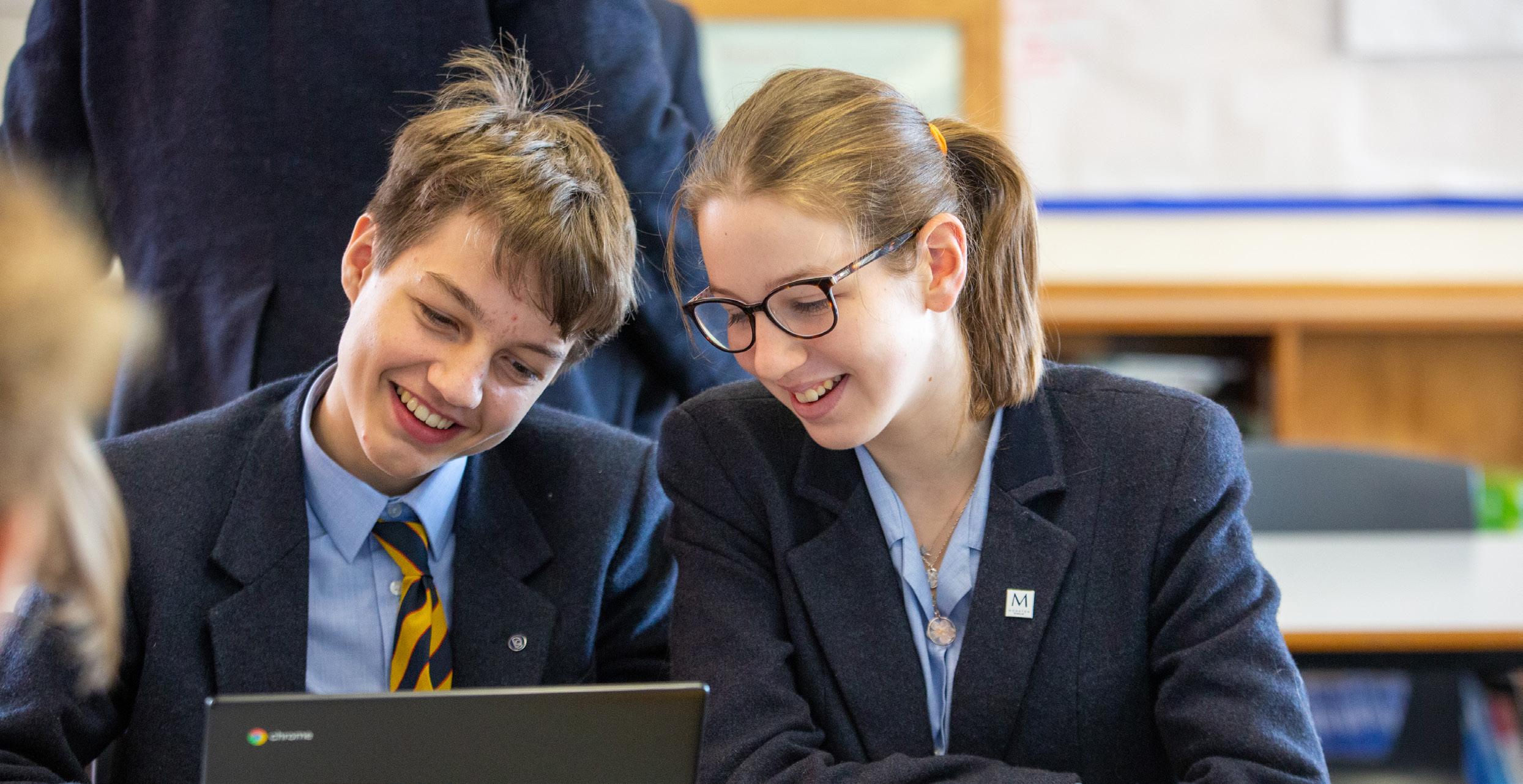
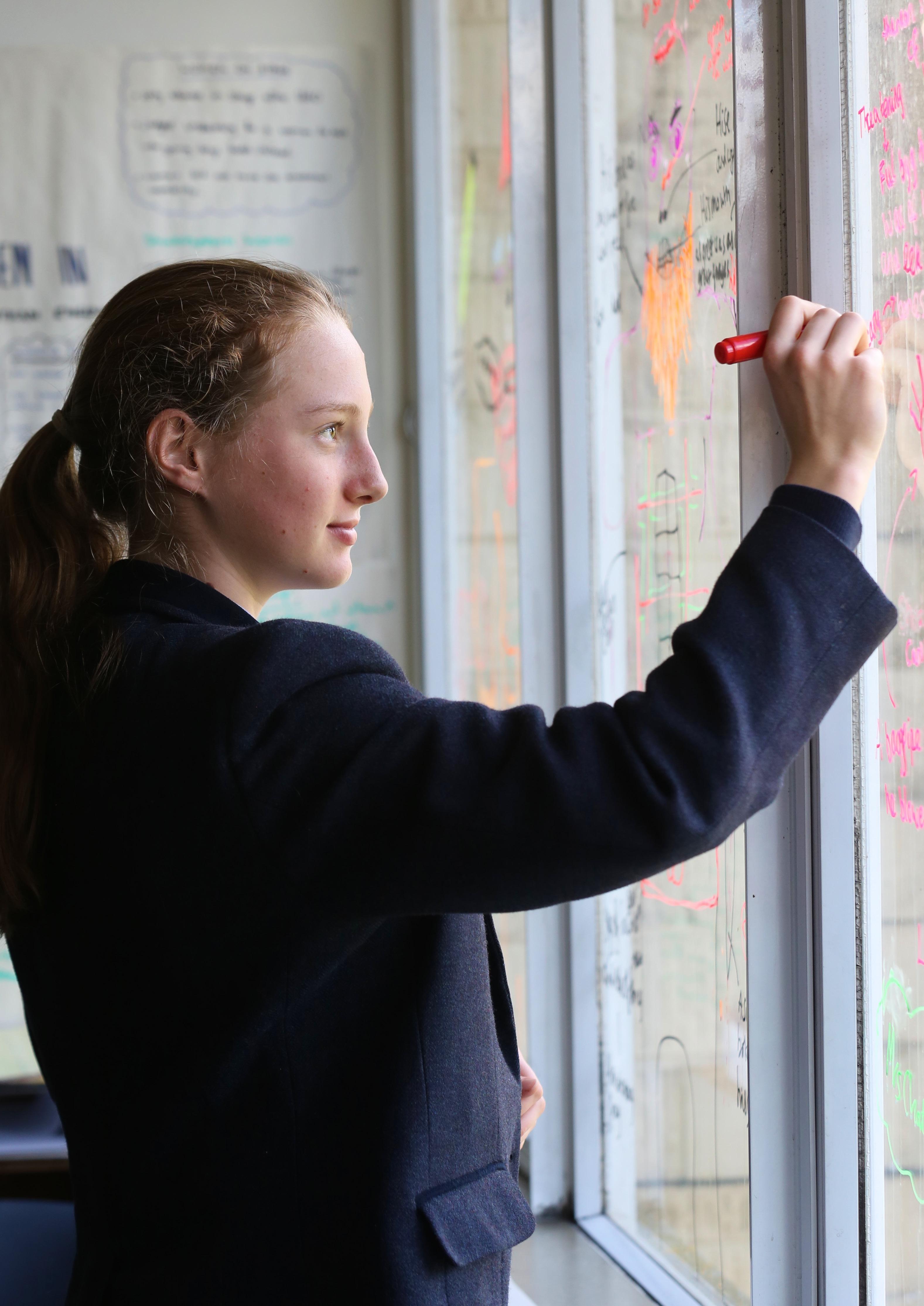
Monkton inspires young people to become courageous, kind and ambitious adults who live fulfilling lives.
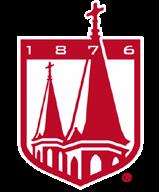
Bellmont Abbey, USA

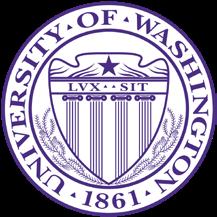
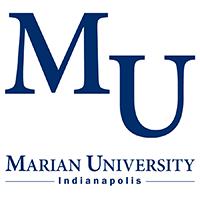
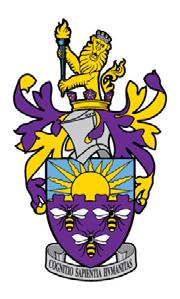
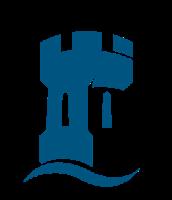
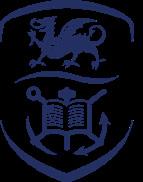
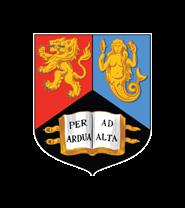
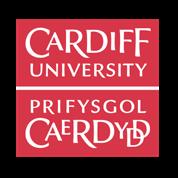
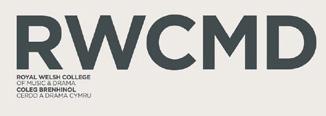
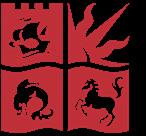
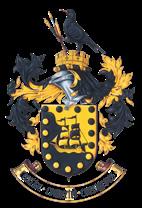
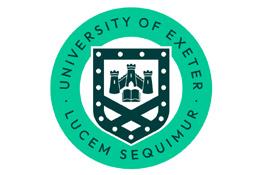
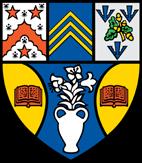
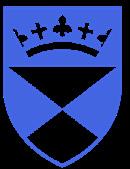
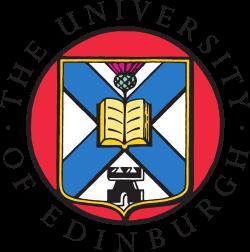
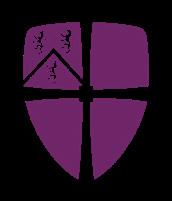
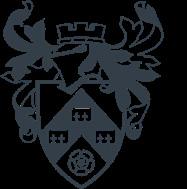
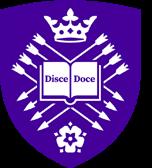
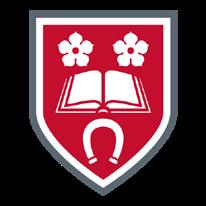
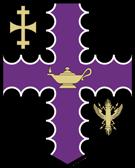
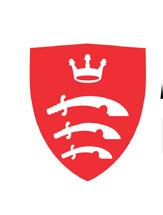


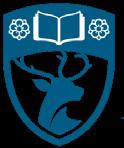
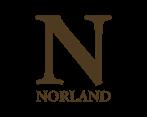
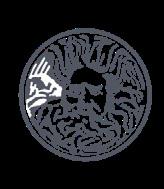
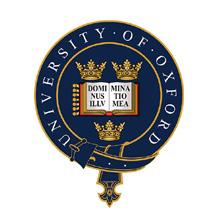
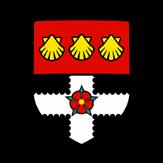
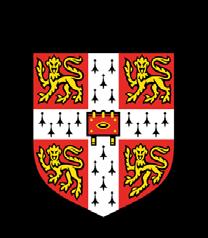
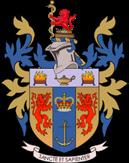
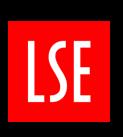


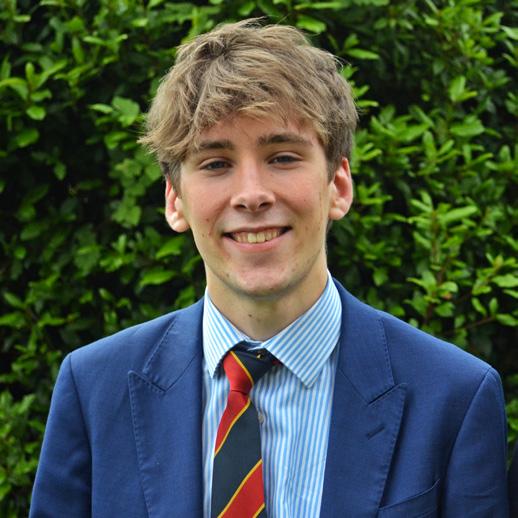
Alex Bichard, now thriving in his second year of Medicine at Merton College, Oxford, speaks with real gratitude for Monkton’s Medicine Programme. He recalls the Science Department’s “empathy and flexibility around workload,” and how teachers went the extra mile to adapt lessons to his interests. Alex also embraced wider opportunities — from inspiring guest speakers to ophthalmology work experience — supported every step of the way by teachers who encouraged him, gave feedback, and opened doors through their medical networks.
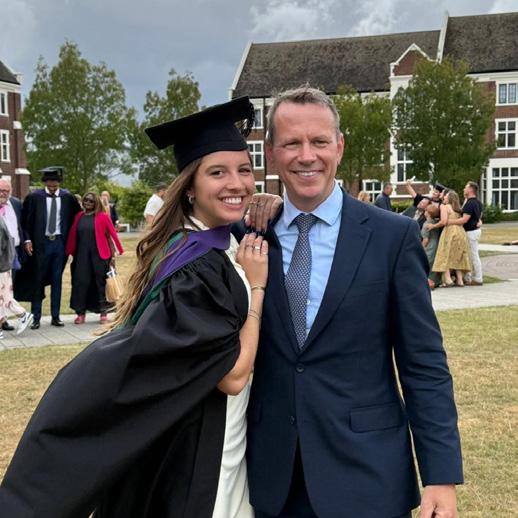
FIRST CLASS BA(HONS) HISTORYLOUGHBOROUGH
“Monkton’s engaging teachers and interesting History lessons first sparked my interest in learning about people and places. The trip we took to Berlin in Year 10 even inspired me to spend my university year abroad in the city – and to start learning German. Sport was also a huge part of my time at Monkton – playing in the first teams set me up well to contribute to life at sport-fuelled Loughborough.”
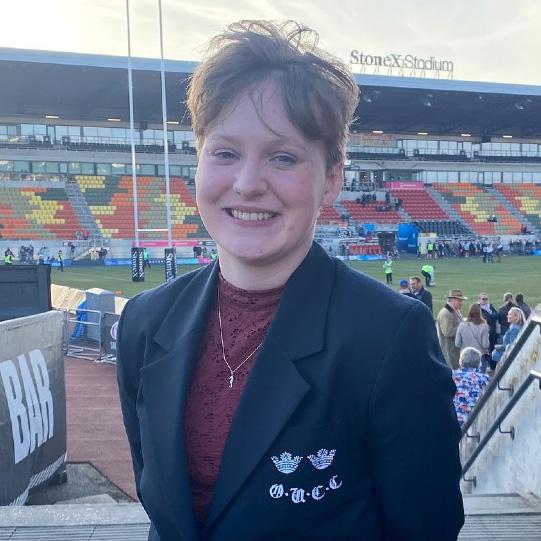
“Monkton has supported me in exploring my wide ranging academic interests. Throughout the earlier years I changed my mind multiple times about what I wanted to study at University before settling on Physics. I was never pigeonholed into one area but encouraged to pursue Maths and Science as well as Languages and Philosophy. My teachers were focused on developing a love of learning and a passion for their subjects whilst also achieving great exam results. They always gave me extra challenging material and never tired of answering my incessant questions which has laid an amazing foundation for my later studies.”
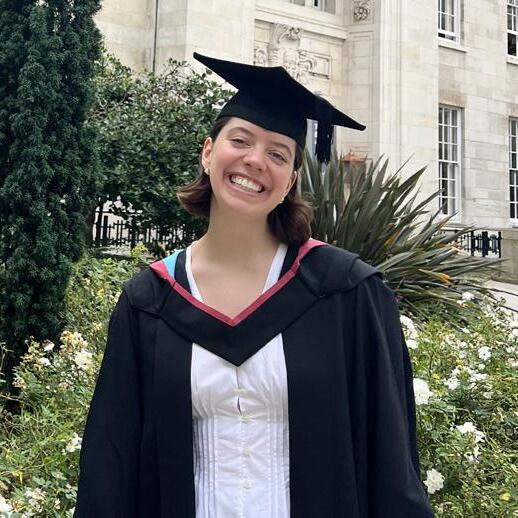
“I was really taken with the range of subjects available at Monkton, especially when it came to languages. I started learning French in the prep school and took on Mandarin at GCSE level – both of which I carried through to my degree, which included stints in Martinique and China. This early exposure to languages, alongside truly lovely teachers and a fun syllabus, sparked a lasting interest in cross-cultural communication.”
Year 10 is an exciting time at Monkton. It is the start of your GCSE courses and the first time students will have chosen the majority of their subjects. Monkton seeks to ensure students are given as much autonomy as possible, guided and supported by their tutor, houseparents and teachers, and we are unusual in that English Language and Literature, or EAL, and Mathematics are compulsory, with all other subjects being placed into one of six blocks. Students typically study two or three Science within the blocks, which are designed to allow students as broad and varied a range of options as possible. Academic expectations deepen in Year 10, led by dynamic, innovative teaching and personal support from your teachers and it is crucial that students have a love of the subjects they choose to study.
Departments offers workshops each week, in which you can receive additional support, that extra help with prep or classwork you are finding difficult. Your tutor will meet regularly with you to discuss your academic progress..
We encourage every pupil to embrade academic challenge, to work diligently from the start of Year 10, building strong foundations for both GCSEs and A-levels.
Where pupils have specific learning needs, our outstanding Learning Support department work 1:1, enabling every pupil to reach their full potential.
For international students, our EAL team offer excellent, tailored lessons to accelerate English acquisition and enable you to thrive in your academic lessons.
The wide range of subjects available at GCSE and A level at Monkton create a platform for you to build the life you want, beyond school.
“
I left Monkton with confidence, belief in myself and my abilities, fantastic A-level results and friends for life.
Gemma, Class of 2024
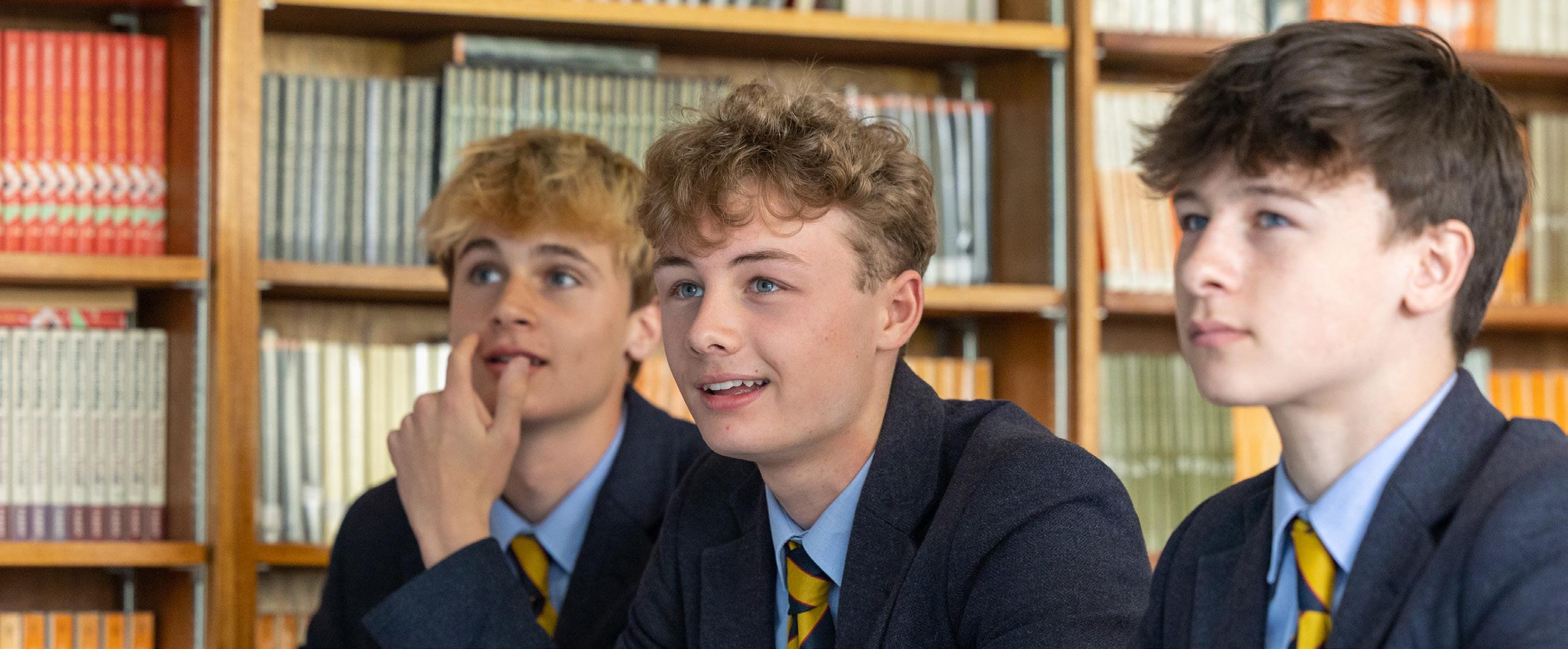

Studying GCSE Photography helps you develop creativity, technical skills, and a critical eye for composition and lighting. It allows you to express ideas visually while learning camera techniques, editing, and visual storytelling. The course boosts problem-solving and analytical skills, and it’s a great foundation for careers in art, media, or design. We are surrounded by images, humans take billions of photos each year; this can help you make sense of the visual culture that we all live in.
In AQA GCSE Photography, you will learn essential technical and creative skills, including how to use a camera manually, control lighting, and compose striking images. You’ll explore different genres like portraiture, landscapes, film, experimental imagery, while experimenting with techniques such as digital editing, darkroom processes, and mixed media. The course emphasises developing a personal style, researching photographers, and analysing their work to inspire your own projects. You’ll also refine your ability to critique images and present your ideas effectively. Through practical assignments and coursework, you’ll build a personal portfolio, preparing you for further study or careers in photography, art, and media.
The AQA GCSE Photography course is divided into two main components: Portfolio (60%) and Externally Set Assignment (40%).
For the Portfolio, you’ll complete a sustained project (or multiple smaller projects) demonstrating your skills in techniques like digital editing, lighting, and composition. This includes research, experimentation, and refining your ideas into a final outcome.
The Externally Set Assignment begins in January of Year 11, when AQA releases a theme with starting points. You’ll develop a personal response through research, planning, and a 10-hour supervised period to produce final pieces. Both components are assessed on four key objectives: developing ideas, refining techniques, recording observations, and presenting a meaningful response.
How is the course examined?
The AQA GCSE Photography course is assessed through 60% coursework (Portfolio) and 40% externally set assignment (ESA).
For the Portfolio, you submit a body of work demonstrating your skills in research, experimentation, and final outcomes. Teachers assess it against four assessment objectives (AO1–AO4), then AQA moderates the marks.
The ESA involves a 10-hour supervised practical exam (usually split over two days), where you create final pieces based on preparatory work. Your response to the ESA theme is marked by teachers and moderated by AQA. Both components are judged on: developing ideas, refining techniques, recording observations, and presenting a personal response.
Why study this subject?
Studying GCSE Fine Art fosters creativity, critical thinking, and self-expression. It enhances observational, technical, and problem-solving skills through drawing, painting, and mixed media. Students learn to analyse artists’ work, developing cultural awareness and artistic appreciation. The course encourages independent thinking, resilience, and experimentation, valuable in any career. It builds a strong portfolio for further art studies or careers in design, media, or architecture. The qualification develops time management and presentation skills, preparing students for higher education. Overall, it nurtures both artistic talent and transferable skills for the future.
What will I learn at GCSE?
Studying GCSE Fine Art will teach you a range of practical skills, including drawing, painting, printmaking, sculpture, and digital art, while exploring creative techniques like composition, colour theory, and mixedmedia experimentation. You’ll learn to analyse artists’ work, understand different styles and cultural contexts, and develop your own ideas from initial sketches to final pieces, refining your personal style. The course also focuses on critical evaluation, helping you assess your own work and others’ to improve through feedback. Additionally, you’ll build a portfolio for further study or careers in art, design, or media, while developing independent thinking, problemsolving, and time management skills. The course balances technical ability with creative freedom, preparing you for A-Level Art or future creative professions.
The GCSE Fine Art course is divided into two main components:
Component 1: Portfolio (60% of grade) – You’ll create a personal project showcasing your skills across different mediums (drawing, painting, sculpture, etc.). This includes research, experiments, and final pieces, demonstrating your creative process.
2. Component 2: Externally Set Assignment begins in January of Year 11, when AQA releases a theme with starting points. You’ll develop a personal response through research, planning, and a 10-hour supervised period to produce final pieces.
Both components are assessed on four key objectives: developing ideas, refining techniques, recording observations, and presenting a meaningful response.
The GCSE Fine Art course is assessed through 60% coursework (Portfolio) and 40% externally set assignment (ESA).
For the Portfolio, you submit a body of work demonstrating your skills in research, experimentation, and final outcomes. Teachers assess it against four assessment objectives (AO1–AO4), then AQA moderates the marks.
The ESA involves a 10-hour supervised practical exam (usually split over two days), where you create final pieces based on preparatory work. Your response to the ESA theme is marked by teachers and moderated by AQA. Both components are judged on: developing ideas, refining techniques, recording observations, and presenting a personal response.
Why study this subject?
3D Design is perfect for creative problem-solvers who love bringing ideas to life. You’ll learn to design and make innovative products using a wide range of materials and techniques through the iterative design process. It’s great for future careers in architecture, product design, jewellery design, engineering and many more. Plus, you’ll develop skills like creative problem solving, critical thinking and project management that are useful in any job.
What will I learn at GCSE?
In GCSE 3D Design, you’ll explore product creation. You’ll learn to sketch and develop ideas, use computer-aided design (CAD) software, and create prototypes. You will also work with different materials like wood, metal, and plastics. You’ll discover the design process, from initial concepts to final products. You will study iconic designers and design movements for inspiration. You’ll learn about sustainability in design and how to consider user needs. By the end, you’ll be able to create exciting innovative solutions.
How is the course structured?
The course is split into two main parts: coursework and exam. In the beginning of Year 10, we focus on building skills through mini-projects. You’ll try out different materials and techniques, and learn to use design software. We also start the main coursework project, which continues into Year 11. This coursework project lets you choose a theme and create a product from start to finish. You’ll research, sketch ideas, develop designs, make prototypes, and produce a final piece. Then in January of Year 11 you will start the exam project which is a mini design and make project.
How is the course examined?
The course is assessed through both coursework and an exam project. The coursework, called the Non-Exam Assessment (NEA), is worth 60% of your final grade. This includes a number of mini projects and then your own personal project which you will begin half way through Year 10 and finish in Year 11. The other 40% comes from an exam project called the Externally Set Assignment, which is set in January and completed in a much shorter space of time, ending with a 10 hour exam in the beginning of the summer term in which you realise your final design.
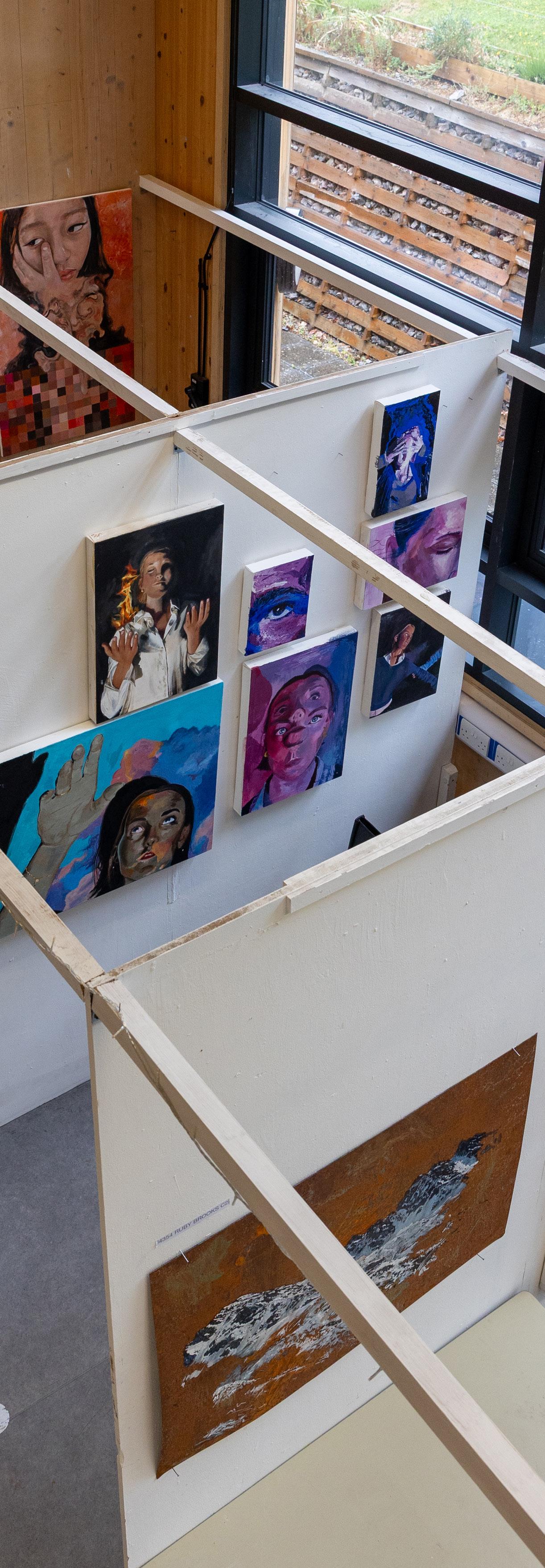
Edexcel IGCSE
Why study this subject?
Taking Maths iGCSE opens doors to many future careers, not just traditionally “mathsy” ones. It sharpens your problem-solving and logical thinking skills, and in addition, it’s a qualification that employers and universities really value highly – it shows you can handle a challenge!
What will I learn at GCSE?
You will build a solid foundation in essential topics like algebra, geometry, statistics, and probability. You’ll learn how to work with equations, understand shapes and space, analyse data, and figure out the chances of things happening. These skills aren’t just abstract ideas; they will help you make sense of the world around you, from budgeting to understanding scientific information. It’s about gaining tools for logical thinking and problem-solving in a mathematical context.
How is the course structured?
We study the IGCSE Edexcel course. This is split into four areas: number, algebra, geometry, statistics. We have constructed a spiral curriculum, so that topics are revisited regularly and in increasing depth. For gifted pupils extension takes the form of UKMT Maths Challenge competitions, enrichment and accelerated learning and the completion of mentoring scheme problems. Provision for pupils requiring learning support takes the form of two timetabled Extra Maths lessons a week, voluntary attendance of three afterschool workshops plus access to a private tutor – at an additional cost.
How is the course examined?
Pupils sit two exams at the end of year 11, each a two-hour calculator paper. Some students may take the Foundation Tier entry in November of Year 11 with the expectation that they will then take the Higher Tier entry in June. The highest set also study the Further Maths GCSE (AQA), with an examiation typically taken in June of Year 11. This prepares students well for A-level Maths and Further Maths by consolidating the harder topics from GCSE as well as exposing them to new exciting topics such as matrices and the binomial expansion.
EDEXCEL
The Business Studies GCSE exposes our inspiring entrepreneurs to the world of commerce, sparking innovation in a commercial context. Students will develop their transferable skills in finance, organisation, planning and risk taking, all needed to fulfill a small business start up. The course is extremely current, using real business case studies from the world around us, from small scale entrepreneurs to larger global enterprises.
What will I learn at GCSE?
Students will cover the internal and external operations of a business including the generation of innovative business ideas, how to compete in new and existing markets, and developing the correct strategic approaches to choose given the external environment in which businesses exist. Covering introductory level finance, people, operation, marketing and the environment, students will cover a range of business activities through diverse learning techniques including enterprise competitions and real life insights through our Business Studies trips.
How is the course structured?
The course begins by investigating small businesses inclusive of converting a business idea into reality and finding the financial resources to start up. The course then develops by investigating how to grow a business, the strategic choices made, sourcing and managing finance, planning and the external legal, competitive and economics environment in which they operate.
How is the course examined?
The course is examined through a mixture of multiple choice, short answer and extended answer questions ranging from 1-12 marks. 2 papers, 50% each, are used to assess this course, each being 90 minute written papers responding to case study data. Extended writing skills are needed for the longer answer/short essay questions and numerical skills are essential throughout. Students are advised to follow current business affairs and read the business news on a weekly basis, following key strategic choices, competitive activities and legislative pressures on business operations.
I think all pupils that leave Monkton are going to be ahead of their peers when they go to University. They don’t just learn skills as an academic exercise, they learn them as a life skill.
Jonathan Belcher Head of Learning Support
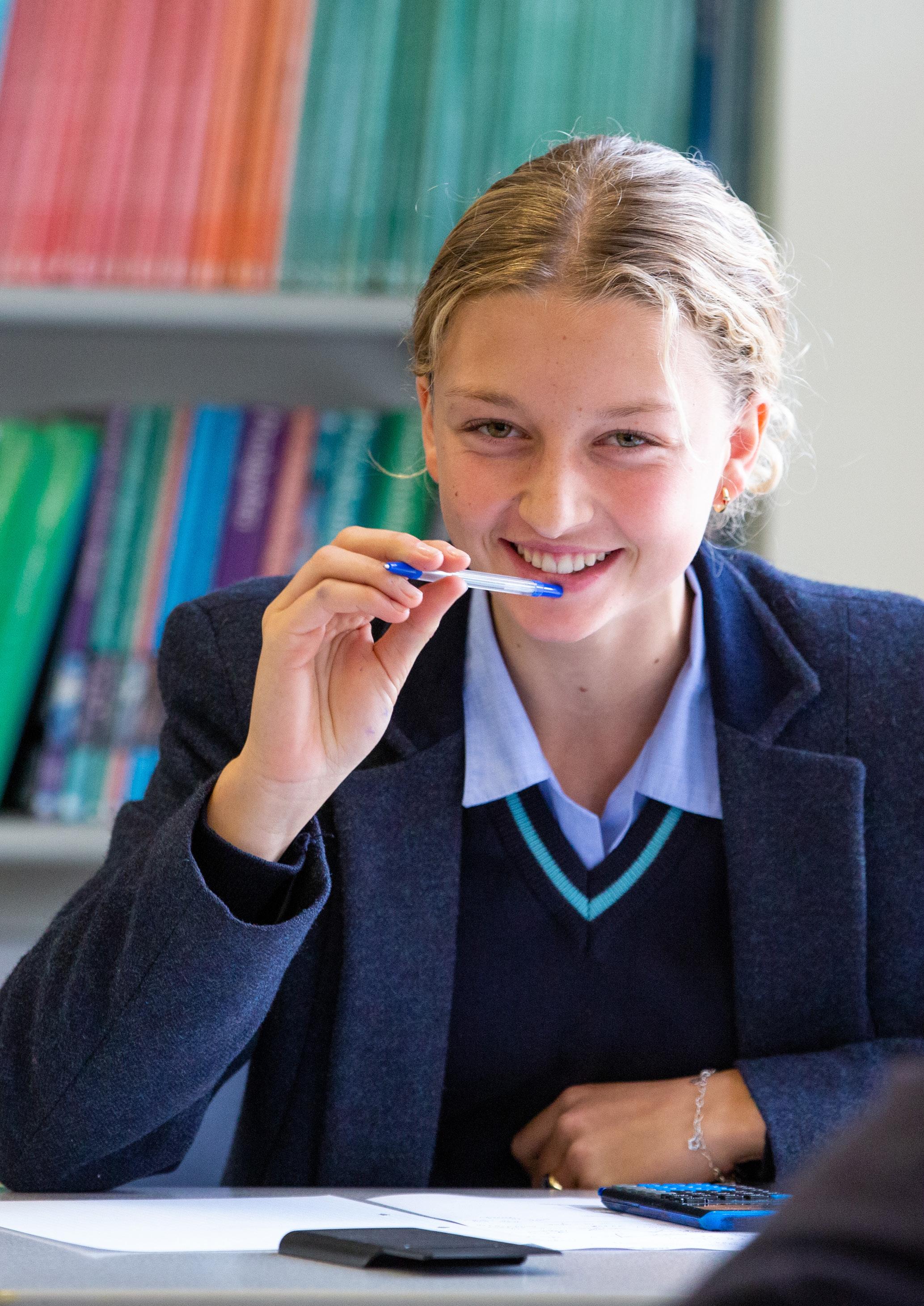
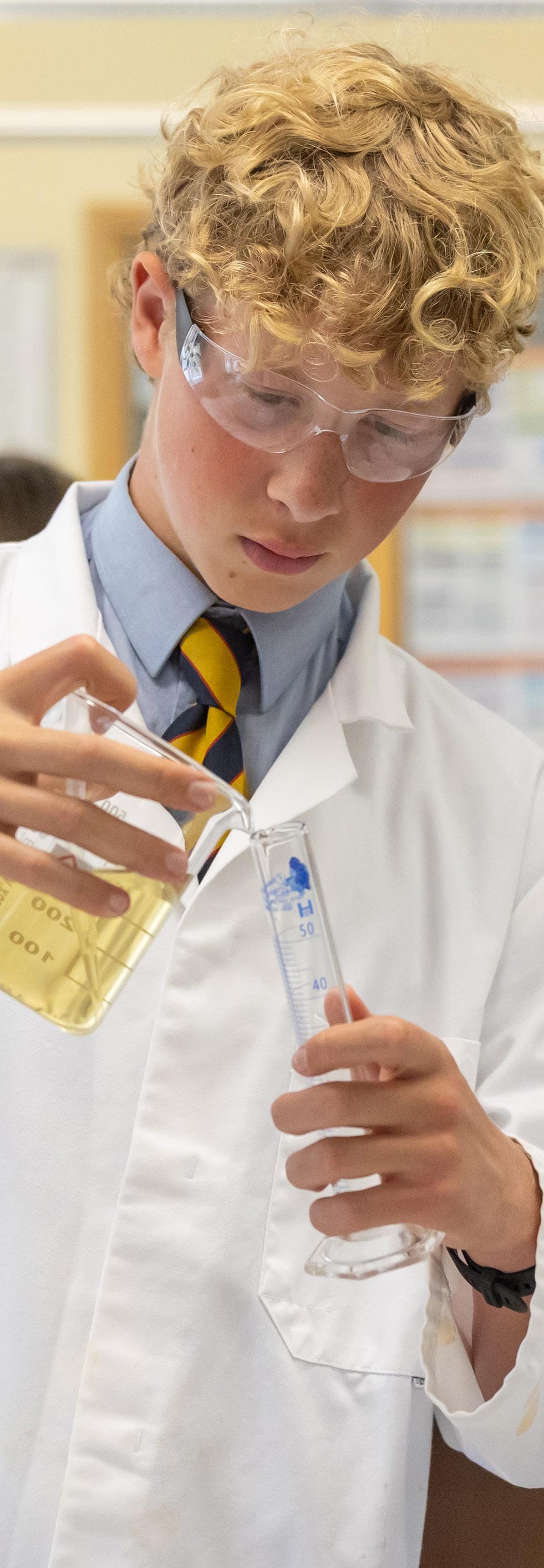
AQA
Biology GCSE provides students with an excellent understanding of the natural world while at the time providing those who wish to study science at A-level with an excellent science grounding.
The aim is to enthuse pupils about the extraordinary sphere of Life on Earth from tiny bacteria to the complicated inner workings of our body. It is important for humans to appreciate that they are part of the world in which they exist and show an understanding of their place in it. By carrying out practical work and following scientific procedure during experiments pupils can learn to anticipate and adjust their lifestyles to become healthy individuals and look after the planet.
We start teaching the GCSE syllabus in Year 9, looking at how cells and the organ systems they are found in keep the body alive. The vital role plants play in ensuring life on Earth exists is also emphasised. The ability to think critically and being able to evaluate information and data is now a fundamental part of Biology at GCSE. In Year 11 the structure and function of DNA (which now forms a core part of the syllabus) is looked at in detail. Much practical work is undertaken to bring to life the academic content we study.
How
There are two exam papers:
• Paper 1 (1h 45): Topics 1–4: cell biology, organisation infection and response and bioenergetics.
• Paper 2 (1h 45): Topics 5–7: homeostasis and response, inheritance, variation and evolution and ecology.
We offer a large and diverse range of subjects and provide them with the guidance and skills to make informed decisions at each step of the academic journey. “
Victoria Armand-Smith Deputy Head Academic
Why study this subject?
Students will learn to approach the real world with an analytical eye and logically apply the ideas and skills learnt in Physics to each situation. The course offers a chance to put practical skills and academic knowledge together, aiding students to develop through kinesthetic learning and more traditional learning styles. Students will also further develop their analytical skills as data is collected and processed, helping them to reach valid and reliable conclusions. These skills will be vital in studying A-level and beyond, as well as being sought after by employers especially in Physics, Engineering, Computer Science and other related fields.
What will I learn at GCSE?
The course comprises 8 topic areas covering Energy; Electricity; Model of Matter; Radioactivity; Forces; Waves; Magnetism and electromagnetism; Space. Throughout the course we aim to develop the knowledge and understanding in Physics through both working practically and through scientific thinking. Ideas of how the universe began to current day thinking on climate change are discussed, with each student considering their experiences and responsibilities in a rapidly changing world. Students will also develop their mathematical skills, whilst molecular Chemistry and Human Biology lend themselves to the content of the Physics course.
How is the course structured?
Content is delivered one topic at a time through classroom teaching; debates and discussions; practical experiments and demonstrations; questions and assessments; online digital simulations. However, as the students build their knowledge and understanding, links between the topic areas are built and explored.
How is the course examined?
The AQA Physics GCSE 9-1 course has 2 exam papers in which knowledge, practical understanding, application and evaluation skills are assessed. There is no practical assessment involved, but questions within the exam papers will have practical elements.
• Paper 1 (1h45 - 100 marks)assesses topics 1-4: Energy; Elect ricity; Model of Matter; Radioactivity
• Paper 2 (1h 45 - 100 marks) assesses topics 5-8: Forces; Waves; Magnetism and Electromagnetism; Space
Why study this subject?
Chemistry helps us understand the materials and processes that shape our world. It develops analytical thinking, problem-solving, and practical skills, and is essential for careers in science, healthcare, and engineering. It also supports learning in Biology and Physics, and is essential for the study of both A Levels Chemistry and Biology.
What will I learn at GCSE?
You will study a wide range of topics that show how chemistry connects to the world around us. These include atomic structure, bonding, chemical reactions, energy changes, rates of reaction, organic chemistry, and chemical analysis. You’ll also explore the chemistry of the atmosphere, sustainable resource use, and environmental impact. Practical experiments throughout the course will strengthen your investigative and analytical skills, helping you interpret scientific data and understand real-life chemical processes.
How is the course structured?
Students have four lessons a week, including a double lesson often focused on practical work to develop analytical skills and reinforce theory. In Year 9, students build core knowledge of atomic structure, the Periodic Table, ions, resources, environmental impact, and analytical methods. Year 10 introduces bonding and structures, organic chemistry, metals, acids, salts, rates of reaction, energy changes and quantitative chemistry. The course is completed in Year 11 covering Group 7 chemistry, electrolysis, fuel cells, chemical equilibria, and more advanced organic chemistry concluding with applied chemistry and sustainability, revisiting and integrating previous learning.
How is the course examined?
Assessment is by two written exams, each 1 hour 45 minutes.
• Paper 1 covers topics 1-5: atomic structure, bonding, quantitative chemistry, chemical changes, and energy changes.
• Paper 2 covers topics 6-10: rates of reaction, organic chemistry, chemical analysis, atmospheric chemistry, and using resources.
Both papers include multiple-choice, structured, and extended-response questions. There is no coursework, but practical skills are tested in the exams through questions based on required practical activities completed during the course.
There are 8 required practicals. Practicals 1-4 can be assessed in Paper 1 and Practicals 5-8 in Paper 2.
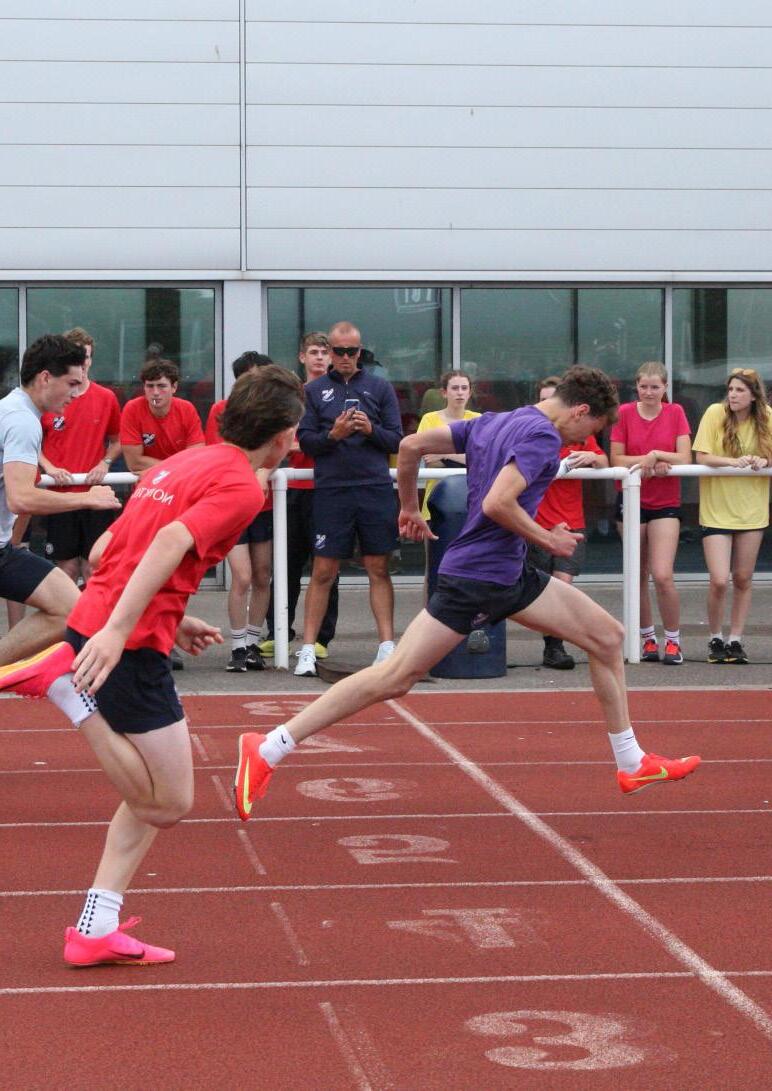
Why study this subject?
In GCSE PE we explore sports performance in depth, enabling you to understand how your body works when exercising and how to aid your performance, in addition to delving into the world of elite sport and training. Taking this GCSE will allow you to study Physical Education further and potentially pursue a career in sport.
What will I learn at GCSE?
You will cover topics on anatomy and physiology, movement analysis, health and fitness, sports psychology, ethical issues, commercialisation, sports technology and diet. You will also get the chance to improve and analyse your practical performance through practical and written aspects.
How is the course structured?
We aim to teach 4 topics in Year 10 and a further 2 in Year 11. We will also start the coursework in Year 10 where pupils must complete an evaluation of their performance in one sport and provide a training programme for improvement. In addition to this, we conduct some practical lessons and mock moderation sessions that allow the students to be assessed practically across three sports in both skills and competition. Lastly, students have one double and two singles lesson across a weekly timetable.
How is the course examined?
Topics 1-3 are assessed through paper 1 and topics 4-6 are assessed through paper 2. Both exams are completed in the summer of Year 11 and each are worth 30% of the overall course grade, totalling 60%. The coursework piece is worth 10%, whilst the three sports are worth 10% each, totalling 40% non-exam assessment. The three sports chosen must be from the AQA specification and they must be a mixture of team and individual sports. Students are advised to be playing at least two sports to school first team or higher levels and must be willing to commit to filming their practical performances.
Monkton promoted my development in triathlons through coaches who have tailored sessions so that I can progress further. “
Josh Class of 2025
EDEXCEL
Why study this subject?
Computer Science GCSE is an ideal foundation for further study in Computer Science, as well as providing understanding the principles of Computer Science students with the underpinning knowledge required for many other subjects in science and engineering.
What will I learn at GCSE?
You will learn computational thinking, alongside programming by writing pseudocode. This will lead you onto high-level computer languages (Python) and develops your understanding of the main principles in problem-solving using computers. Students will apply their understanding to develop computer based solutions to set problems. You will also develop a range of technical skills, including the ability to test effectively and to evaluate computing solutions. Students will look at current computing technologies, considering the benefits of their use, as well as recognising the ethical issues and potential risks when using computers. Students are taught the component parts of computer systems, including software, data, hardware and network communication, and how they all interrelate.
How is the course structured?
You will study hardware, software and network communications in Paper 1. In addition, there is consideration of the UK laws, ethical and cultural arguments needing to be considered when using computer systems and developing further technologies. In Paper 2, algorithms and problem solving skills are developed and tested, along with programming in Python via the Google IDE Colab. We also delve into some mathematical skills with boolean logic and truth tables. The content of the two papers are taught simultaneously, building confidence and depth throughout the two years.
How is the course examined?
There are two externally examined papers:
Paper 1 - Computational Systems
1 hour 30 minutes 65%
This paper consists of multiple choice questions, short response questions and extended response questions.
Paper 2 - Computational thinking, algorithms and programming
1 hour 30 minutes 45%
This paper has two sections: Section A and Section B. Students must answer both sections. In Section B, questions assessing students’ ability to write or refine algorithms must be answered using either the OCR Exam Reference Language or the high-level programming language with which they are familiar (generally Python).
EDUQAS
Why study this subject?
Choosing GCSE Drama isn’t just about the stage – it’s about building life skills that will set you apart in the future, equipping you with the tools to succeed in any career. Employers highly value creativity, problem-solving, and teamwork – all of which are at the heart of what you’ll learn in Drama.
Drama also sharpens your emotional intelligence, empathy, and ability to adapt, preparing you to thrive in any environment.
What will I learn at GCSE?
You will develop creative and analytical skills by exploring drama from acting and design perspectives. The course promotes enjoyment of drama through practical work, including creating original theatre and performing extracts from play texts. You will study theatre practitioners and genres, experiment with dramatic forms and techniques, and learn how to interpret texts for performance. Opportunities to attend live theatre will help you become an informed and thoughtful audience member. You will also develop skills in working collaboratively, producing high-quality theatre, and demonstrating your understanding in a written examination.
How is the course structured?
The course is structured into three components.
Component 1: You will participate in the creation, development and performance of a piece of devised theatre in response to a stimulus.
Component 2: You will study two extracts from the same play and then create a performance using sections of text from both extracts.
Component 3: Exam at the end of year 11 that will test your knowledge of both a set text and live theatre.
How is the course examined?
The course has 3 examined components. As well as a final written exam, there are 2 performance exams. Component 1 is internally assessed (and externally moderated) in the Summer Term of Year 10. Component 2 is externally assessed by a visiting examiner in the Lent Term of Year 11.
I love how there’s so many opportunities to get more comfortable on the stage and in front of people. “
Anouk
Scholar
Edexcel IGCSE
Why study this subject? (max 60 words)
English Literature brings stories, characters, and ideas to life. You’ll develop skills in critical thinking, empathy, and expression—key qualities for success in many subjects and careers. You’ll explore different global perspectives and learn to engage with big ideas by noticing the small details in texts that reveal deeper truths about people and societies.
What will I learn at GCSE?
You will explore a range of powerful texts, including modern prose, poetry, drama, and a literary heritage text. Authors studied range from Shakespeare to Achebe, spanning modern and traditional works from both British and global traditions. You’ll be encouraged to read habitually beyond the course, comparing texts and appreciating nuanced differences in meaning. You’ll learn to analyse how writers use language and structure, reflect on social and historical contexts, and engage in critical debate. Alongside becoming a powerful, clear, and confident writer, you will develop discussion skills that enable you to express ideas with precision and insight.
How is the course structured?
The course is made up of two papers. In Paper 1 (examined, 60% of the course), you’ll study poetry from an anthology, respond to unseen poetry, and explore a modern prose text, with the opportunity to demonstrate analytical, comparative, and critical skills. In Paper 3 (coursework, 40% of the course), you will complete two written assignments: one on Modern Drama—either Priestley’s An Inspector Calls or Miller’s A View from the Bridge—and one on a Literary Heritage text, Macbeth. This structure develops a wide range of reading, writing, and evaluative skills across varied literary forms and traditions.
How is the course examined?
Sixty percent of the course is assessed through a two-hour exam (Paper 1) at the end of Year 11. Section A focuses on unseen poetry, where analytical skills are key. Section B covers anthology poetry, requiring a detailed comparison of two studied poems, both reprinted in the paper. Section C is a more traditional essay on either Achebe’s Things Fall Apart or Ishiguro’s Klara and the Sun, asking you to consider how wider contexts might influence your interpretation. The remaining 40% is assessed through Paper 3 (coursework), with essays on character, theme, and writer’s craft written under controlled conditions.
EDUQAS
GCSE music develops a vast array of skills: written, analytical, practical, social/personal symbiotic and performative. Above all, the course looks to develop your creativity and your self-expression through performing and composing and our department puts a particular emphasis on the development of these skills through our curriculum planning and teaching strategies.
What will I learn at GCSE?
You will develop your composition skills and your technology skills as you make use of Sibelius and Logic production software in order to produce your work. You will also develop your analytical skills when listening to and appraising different styles of music. Finally, you will develop as both a solo performer on your individual instrument and you will develop your ensemble skills through working with other musicians in small groups.
How is the course structured?
The listening and analysis part of the course is based around four key areas of study:
Area of study 1: Musical Forms and Devices
Area of study 2: Music for Ensemble
Area of study 3: Film Music
Area of study 4: Popular Music
We will cover all four areas over the course of the two years and your compositions and performances will be linked to these areas.
How is the course examined?
Composition forms 30% of the total mark. Throughout the course, you will create two compositions: one based on a specific brief, the other based on a brief of your own choice
Performance forms another 30% of the total mark. Here, you will produce one solo and one ensemble performance over the course of two years.
At the end of the second year, you will sit a 75 minute listening paper which constitutes 40% of the total marks. It includes in-depth questions related to set works studied during the course and a series of unfamiliar pieces that you will be required to appraise.
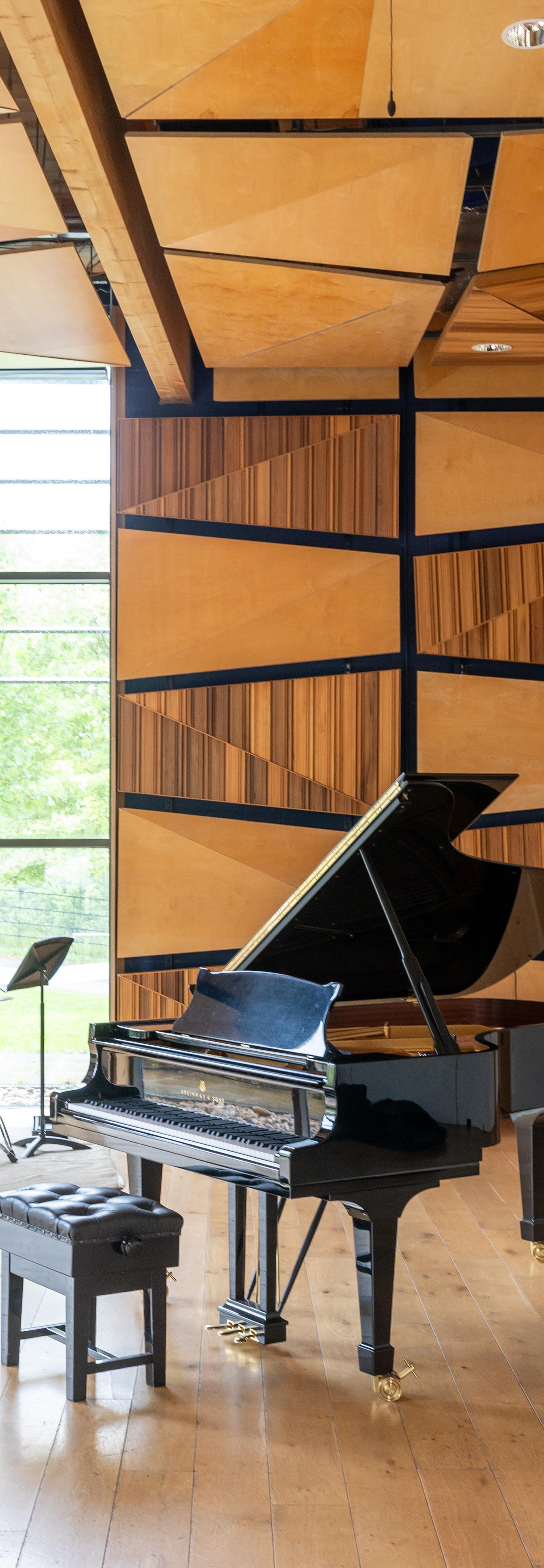
Edexcel IGCSE
Why study this subject?
English Language helps you become a confident communicator. You’ll appreciate how language can shape response and thought, as well as how to craft your own language for effect. The course develops adaptive communication skills and an attentiveness to the small details in texts, sharpening your thinking, strengthening your writing, and preparing you for every subject—and every future—where words matter.
What will I learn at GCSE?
You will develop your reading, writing, and analytical skills through the study of a wide range of texts, including nonfiction, poetry, and prose. You’ll learn how to structure your own writing for maximum impact and how to respond to structural features in texts. You’ll practise adjusting language to suit different contexts and audiences, both in imaginative and transactional writing. Alongside expressing yourself clearly and effectively, you will develop the ability to communicate about how language shapes the world around us, appreciating the power of words to influence thought, feeling, and perspective.
How is the course structured?
The course includes one examined component and one coursework component. For the exam, you study a selection of non-fiction texts and practise writing for different real-world purposes, learning to analyse language by imitating styles and techniques from accomplished writers. There is plenty of scope for imaginative and creative thinking, balanced with building a technical skill set to break down how writing works. For the coursework, you complete two assignments: one analytical essay comparing three literary texts from the anthology, and one piece of imaginative writing where you apply the techniques you have studied to craft your own original work.
How is the course examined?
Sixty percent of the course is assessed through a two-hour and fifteen-minute exam focusing on non-fiction reading and transactional writing. In the reading section, you will respond to an unseen text and compare it to an anthology text through a range of comprehension, analysis, and comparative tasks. Strong communication and careful reading are essential, with plenty of overlap in the skills required for the Literature course. The remaining 40% is assessed through coursework: two written assignments completed under controlled conditions and marked internally.
Why study this subject?
All EAL lessons promote communicative English in order to build English confidence and competence across the curriculum and outside the classroom. As a specialist small group provision, the learning is tailored to the specific needs of the students to maximise engagement and accelerate progress.
What will I learn at GCSE?
The Year 10 programme of study covers the first half of the Cambridge ESL IGCSE syllabus. Through developing skills in English reading, writing, speaking and listening combined with strengthening their grammar and vocabulary range, students will learn how to understand and use English effectively in daily life, with an increasing focus on academic English use.
How is the course structured?
EAL students take five English as an Additional Language lessons a week during mainstream English lessons following the Cambridge IGCSE English as a Second Language examination course. Year 10 provides an IGCSE course foundation by developing English skills, grammar and vocabulary. Students cover examination topics and are introduced to specific exam techniques. There is also an emphasis on academic English for use across the curriculum. Year 11 continues to develop English skills, vocabulary and grammar. It also focuses more specifically on IGCSE exam preparation.
How is the course examined?
The IGCSE is assessed in three examinations: a two-hour reading and writing paper, a fifty-minute listening paper and a fifteen-minute oral exam. Each language skill accounts for 25% of the overall grade. There is no coursework component. At Monkton, there are internal assessments at the start and midpoint of each year to track progress. Additionally, at the end of Year 10, students will have the valuable experience of taking past papers under exam conditions, and again in the mocks in Year 11, to help them gain familiarity with the exam requirements.
Having 1:1 time was really great because you can go into depth.
Julia Current Pupil
Why study this subject?
By taking on French GCSE we hope to foster an interest in the language, always encouraging you to see that language learning is a stepping stone to different pathways. Language will give you a broader choice for your A Levels, courses at university, for travel or just communicating with people across the globe in the world’s fifth most spoken language.
What will I learn at GCSE?
You will be immersed into a French environment in the classroom, learning about France and French speaking cultures and societies. In the classroom you will be encouraged to take an active part in lessons and whether it be through authentic materials, conversations with peers, or even having visiting native speakers, you will have plenty of opportunities to practise your French. All GCSE French students have the extra opportunity for one-to-one, or paired speaking practice in our compulsory weekly speaking session as part of your language and exam learning.
How is the course structured?
Pupils are assessed in four different elements: Listening, Reading, Written and Spoken French. The course is divided into modules and topics: Identity and Culture, Local Area, Holiday and Travel, Education, Future Aspirations, Study and Work, International and global dimension. Each module is subdivided into different topics and grammar structures, relevant to each topic.
How is the course examined?
AQA Exam Board: At the end of Year 11 pupils will externally assessed exams depending on ability: Foundation or Higher Tier. Pupils are examined in all four aspects: Speaking is conducted internally by the subject teacher and assessed externally while the other three components, Listening, Reading and Writing are externally assessed.
Why study this subject?
Mandarin Chinese is spoken by nearly one third of the world’s population and has become increasingly important as a language of global diplomatic, political and business importance. A level of proficiency in this language could help you stand out in tomorrow’s jobs market, giving you that competitive edge.
What will I learn at GCSE?
You will not only learn spoken Mandarin, but you will have the opportunity to look into China and Chinese speaking histories, cultures and societies.You will learn how to write those amazing characters and by the end of the year be able to read some Chinese! Through authentic materials, conversations with peers, or even having visiting native speakers, you will practise your Mandarin. All GCSE Mandarin students have the extra opportunity for one-toone, or paired speaking practice.
How is the course structured?
Pupils are assessed in four different elements: Listening, Reading, Written and Spoken French. The course is divided into modules and topics: Identity and Culture, Local Area, Holiday and Travel, Education, Future Aspirations, Study and Work, International and Global Dimension. Each module is subdivided into different topics and grammar structures, relevant to each topic.
How is the course examined?
AQA Exam Board: At the end of Year 11 pupils will externally assessed exams depending on ability: Foundation or Higher Tier. Pupils are examined in all four aspects: Speaking is conducted internally by the subject teacher and assessed externally while the other three components, Listening, Reading and Writing are externally assessed.
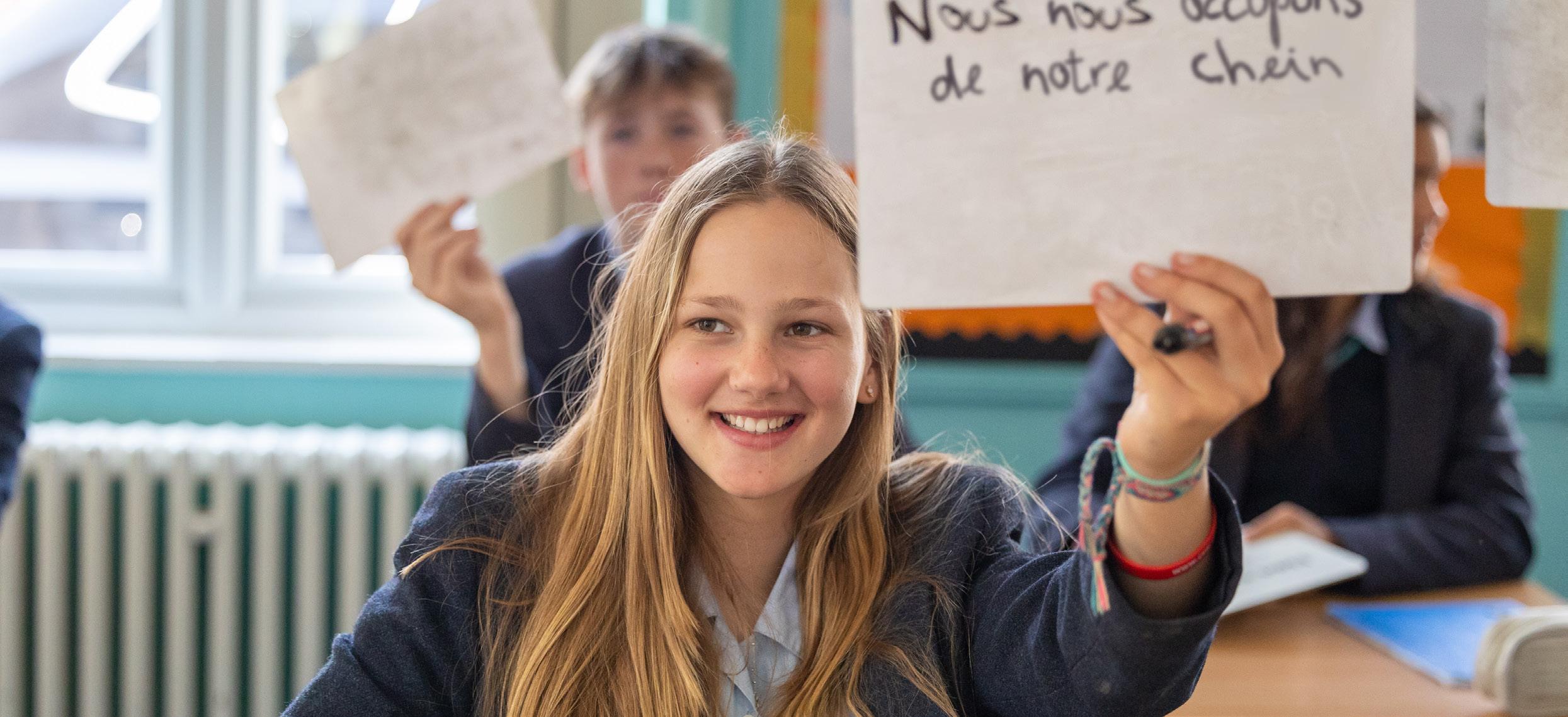
AQA OCR
Why study this subject?
With over 400 million people speaking Spanish, studying Spanish at GCSE is a wonderful opportunity to expand your academic knowledge. By demonstrating valuable transferable skills you can have a deeper understanding of Hispanic cultures. The Russell Group of universities (top 24 universities) recommends the studying of a foreign language at GCSE.
What will I learn at GCSE?
The course for Spanish GCSE is fun, fast-paced and highly rewarding. In the classroom you will learn not only the language but about Spain and Spanish speaking cultures and societies. You will be encouraged to be brave and take risks in lessons; whether it be learning the language through authentic material or conversations with peers you will have plenty of opportunities to practise your Spanish. All GCSE students have the extra opportunity for one-to-one, or paired speaking practice in our compulsory weekly speaking session as part of your language and exam learning.
How is the course structured?
Pupils are assessed in four different elements: Listening, Reading, Written and Spoken Spanish. The course is divided into modules and topics: Identity and Culture, Local Area, Holiday and Travel, Education, Future Aspirations, Study and Work, International and global dimension. Each module is subdivided into different topics and grammar structures, relevant to each topic.
How is the course examined?
AQA Exam Board: At the end of Year 11 pupils will externally assessed exams depending on ability: Foundation or Higher Tier. Pupils are examined in all four aspects: Speaking is conducted internally by the subject teacher and assessed externally while the other three components, Listening, Reading and Writing are externally assessed.
Why study this subject?
In 1996 Sir Anthony Cleaver wrote about the impact of learning Latin at senior schools. He listed the increased ability to read and write English with correct understanding, increased ability to learn other foreign languages, increased appreciation of the influence of Roman civilisation on the course of western civilisation, and less obviously, the development of correct habits of reflective thinking applicable to the mastery of other subjects of study and to the solution of analogous problems in daily life - the increased ability to make formal and logical analyses.
The GCSE Latin course has two elements. Firstly, there is language where a study of grammar, sentence structure and vocabulary enables comprehension and translation of passages of Latin. Secondly, a range of literature is studied, comprising selections from history, letters and poetry. This area of study uses advanced textual analysis and examination of techniques used by Classical authors.
How is the course structured?
In Year 10, the course is split between language work and prose literature texts. Lessons involve translation and comprehension work as well as exposure to new grammar structures.
In Year 11, language work introduces more advanced structures alongside a study of the chosen verse selection (often from Virgil’s Aeneid). At all times, Latin is put into its historical context, vital to its understanding.
How is the course examined?
At GCSE, there are three elements. For language, there is one paper, combining comprehension, grammar identification and translation. There is one paper for prose literature and one for verse literature, both of which include questions on the analysis of the texts, their content and style of writing.
Happy students, taught by talented and inspiring teachers, in a fantastic setting are some of the key ingredients needed for our children to thrive and flourish.
Victoria Armand-Smith Deputy Head Academic
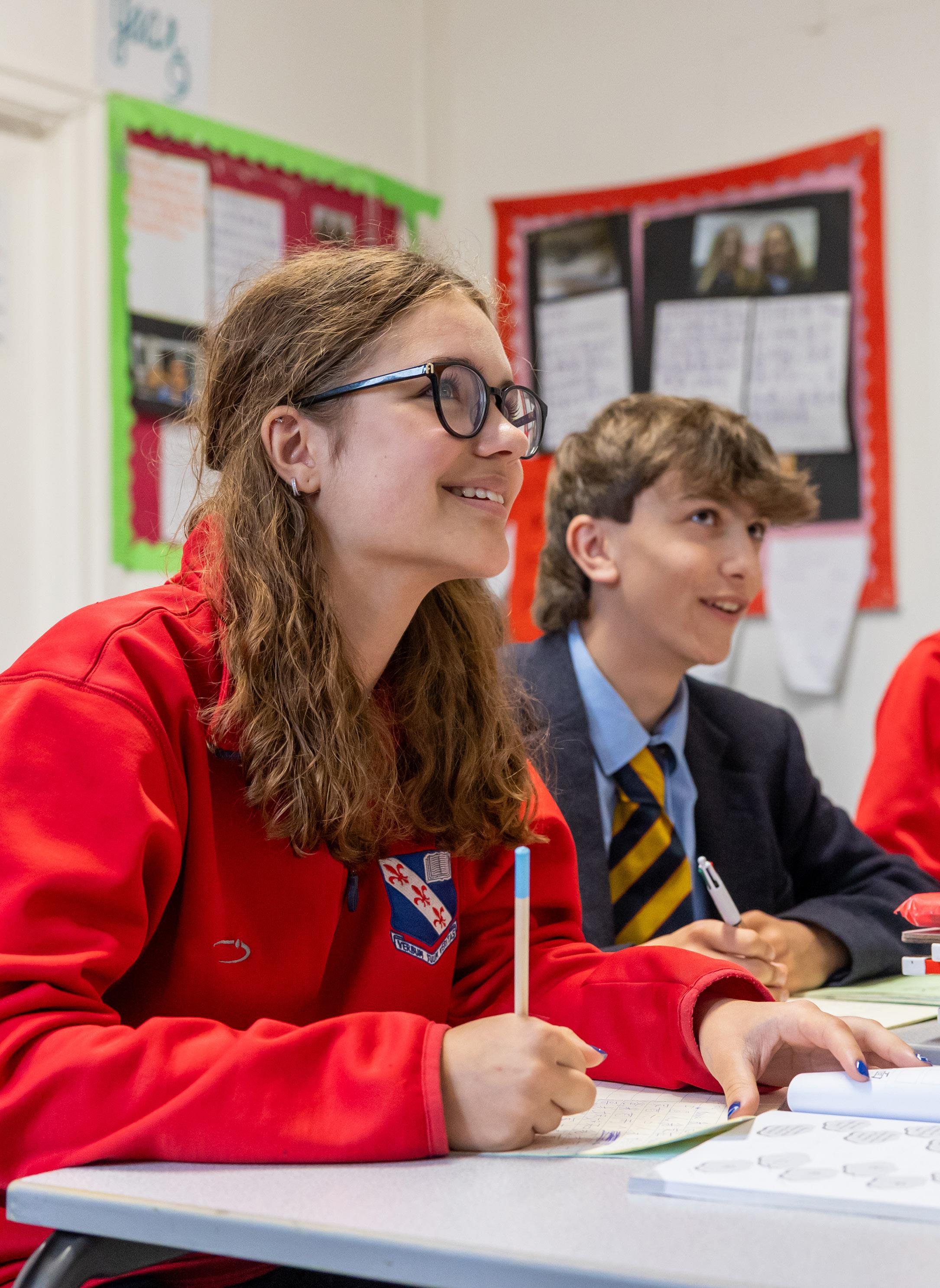
Why study this subject?
The issues studied in Theology, Philosophy & Ethics (TPE) are ones that we all face at some point in our lives. Whether questioning the existence of God, or exploring attitudes towards a wide range of ethical issues, TPE GCSE will equip you with both knowledge and skills as you clarify your own views and understand the beliefs of others.
What will I learn at GCSE?
You will gain a good understanding of the beliefs, teachings and practices set out in both Islam and Christianity, as well as exploring ethical and philosophical perspectives on topics such as war, the environment, social justice and human rights. You will learn to think critically, to listen well to the views of others, to disagree respectfully and to communicate effectively.
How is the course structured?
The course is split into two sections over two years. It involves an in-depth study of two religions (in Monkton’s case Christianity and Islam), followed by an exploration of how religion, philosophy and ethics apply to a wide range of issues in the modern world.
How is the course examined?
Pupils sit two exams at the end of year 11. The first of these is on the beliefs, teachings and practices of Christians and Muslims. The second paper covers four key themes relating to religion, ethics and philosophy. The papers include multiple choice, short answer and essay questions. There is no coursework component.
EDEXCEL
Why study this subject?
History nurtures essential academic and life skillsquestioning, critical thinking, research and effective communication - that support success across a wide range of subjects and careers. GCSE History helps students become thoughtful, informed individuals, well-prepared for higher education and sought-after by employers in fields like law, journalism, business, education, public service, and politics. It is a strong foundation for ambitious futures.
What will I learn at GCSE?
The IGCSE course concentrates on key events in the Twentieth Century that have helped to create our world today. Through a range of activities and an investigative approach to learning, pupils will be taught to analyse and interpret information, construct balanced arguments and arrive at informed judgements. In the Summer Term of Year 10, there is an opportunity to visit Berlin, a city that often found itself at the centre of many of the momentous events that we study in the course.
How is the course structured?
The syllabus itself is broken down into three parts:
- Two depth studies: Development of Dictatorship in Germany, 1918-45 followed by Superpower Relations and the Cold War, 1943-72;
- One investigation topic: East Germany, 1958-90, and;
- One breadth study in change: The Middle East: conflict, crisis and change, 1917– 2012.
How is the course examined?
The Course is assessed by two examination papers, each lasting 1 hour 30 minutes. Paper 1 addresses both depth studies and Paper 2 includes the investigation topic and breadth study.
“
The most valuable thing about studying TPE for me is how it’s encouraged me to go out and understand different religious viewpoints. It’s made me feel way more passionate about my beliefs because I’ve actually critiqued them.
Why study this subject?
Do you ever ask questions about the world around you? Are you interested in finding solutions to rising global temperatures, extreme poverty, or food insecurity? Geography gives you the skills and understanding to explore answers to some of the world’s biggest challenges, blending ideas from both sciences and humanities. Many students choose Geography because of their interest in the content, others choose it to enhance their critical thinking and communication skills in other subjects.
What will I learn at GCSE?
We study a mix of human and physical geography topics - from tectonic hazards and coastal landscapes to urban growth, climate change, and deforestation. Geography brings breaking news into the classroom and takes you outside to see change in action. Along the way, you will master skills in map reading, data analysis, and fieldwork investigation, which can be used as a building block for further study in the subject and also give you skills needed for success in other academic subjects or as you explore the real-world for yourselves.
How is the course structured?
Year 10:
Hazardous Environments (causes, characteristics and management of earthquakes, volcanoes, and tropical storms)
Fragile Environments (causes, impacts, and responses to climate change, deforestation and desertification). Urban Environments (causes of urban change, challenges in urban areas and management of issues in developing cities)
Year 11:
Coastal Environments (processes, landforms, and ecosystems)
Economic Activity and Energy (economic sectors, global inequality and sustainable management of resources) Throughout all topics, students develop cartographic, statistical, and analytical skills, transferable across and beyond the IGCSE Geography course. In addition, we complete two fieldwork projects: analysing city characteristics locally in Bath in Year 10 and exploring coastal landforms in Swanage in Year 11.
How is the course examined?
Assessment is through two examined papers:
• Paper 1: Physical Geography (including fieldwork), 1 hour 10 minutes, 40% of the final grade
• Paper 2: Human Geography (including fieldwork), 1 hour 45 minutes, 60% of the final grade
In both papers students answer a mix of multiple-choice, short-answer, and extended-response questions. Each topic includes an 8 mark question where students apply their knowledge to an unseen resource, in addition to one 12 mark question at the end of Paper 2 which fosters greater debate and evaluation.
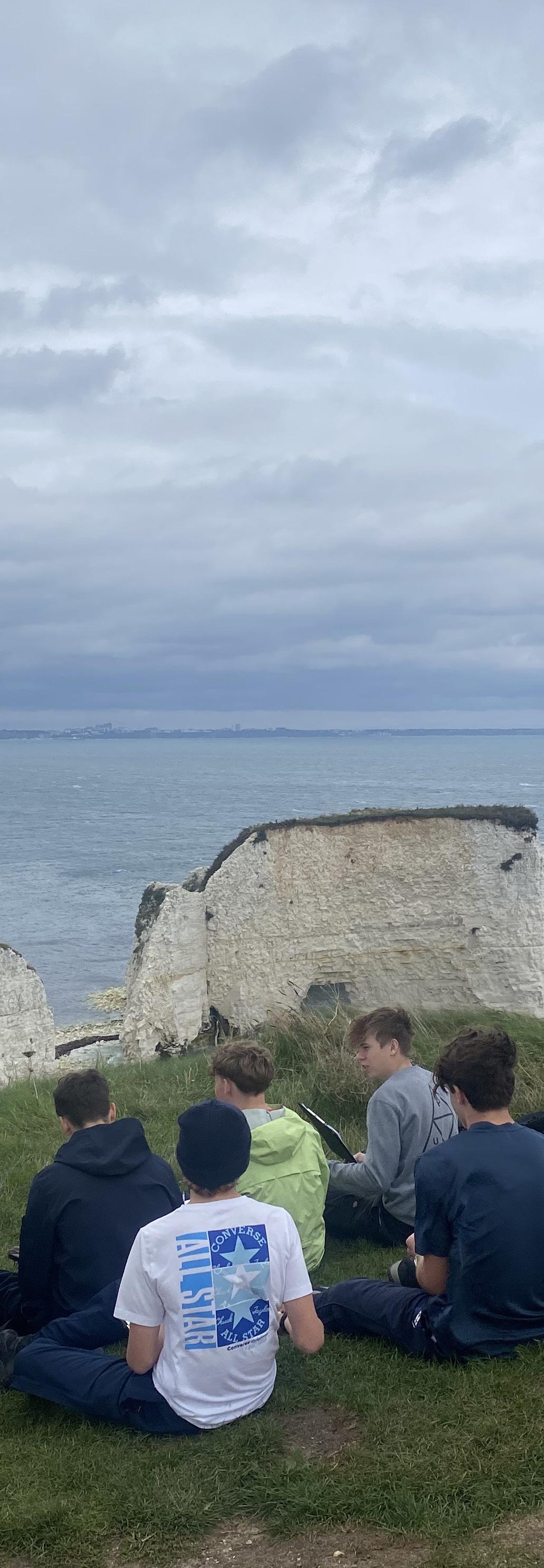
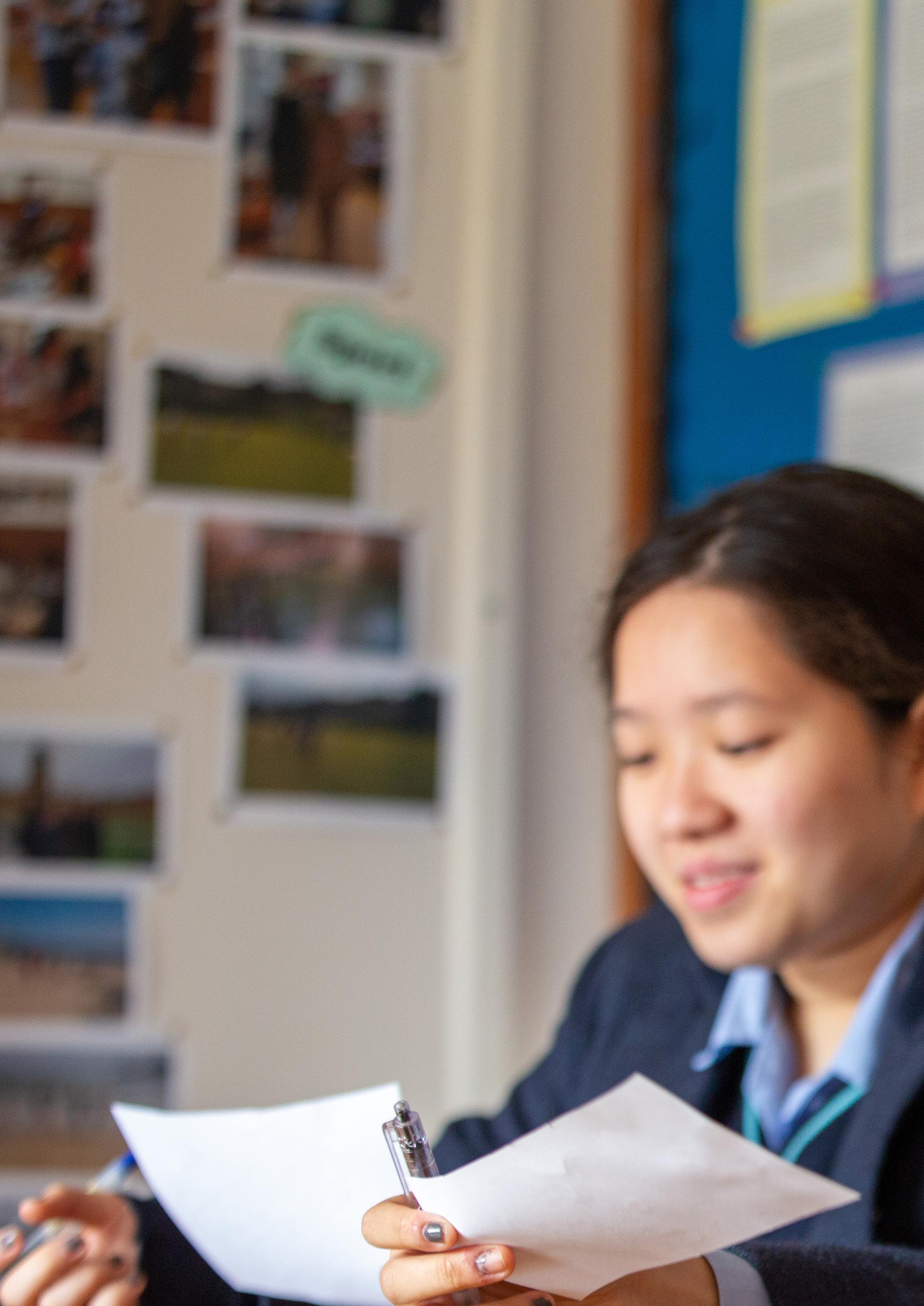
Why study this subject?
This Level 2 Higher Projects Qualification offers you the chance to explore your passion for a subject of your choice and develop independent research and project management skills which are valuable life and study skills. The course provides a focused structure that will enable you to deepen your knowledge in a particular field.
What will I learn at GCSE?
You will learn to manage a small project from start to finish - creating a title, setting aims, planning and managing your time, researching effectively, writing analytically and presenting your findings clearly. The HPQ develops academic confidence, extends your learning experience and prepares you for success in higher education.
How is the course structured?
HPQ is timetabled along with other subjects so you will have two guided learning lessons per week with your supervisor. These lessons focus on helping you acquire the skills needed to complete the project well. At key times during the course, you will have one-to-one meetings with your supervisor in order to help you progress. You can complete a 2,000 word report or produce an artefact supported by a short report.
How is the course examined?
The course is entirely coursework-based, which means that there is no written exam. It is assessed using four criteria: planning and managing your project (AO1), researching and applying data (AO2), selecting and applying specific skills (AO3), and reviewing the project and its outcomes (AO4). These four criteria are aimed at evaluating your ability to conduct a research project independently and to reflect critically about the outcomes.
Why study this subject?
Extra English offers small group, tailored support to build confidence, strengthen skills and raise attainment. It helps students get ahead and feel more in control of their English learning.
What will I learn at GCSE?
You’ll focus on core reading and writing skills, including comprehension, vocabulary, grammar and essay structure. We’ll develop your ability to write clearly and analytically, exploring literary and non-fiction texts in more depth. You’ll also practise exam technique, gain support with coursework, and build the skills needed for confident, independent thinking in English.
How is the course structured?
Extra English is taught in small groups by an English specialist. Each week runs ‘one step ahead’ of your main English course, allowing you to preview key content, grow in confidence, and practise essential skills. Sessions focus on exam preparation, core writing development, and coursework support, tailored to meet your individual needs.
How is the course examined?
Extra English is not assessed as a separate qualification. Instead, it supports your progress in your main English GCSEs. Your development is measured through short written tasks, regular feedback and guided practice, helping you build stronger foundations and feel well-prepared for final assessments.
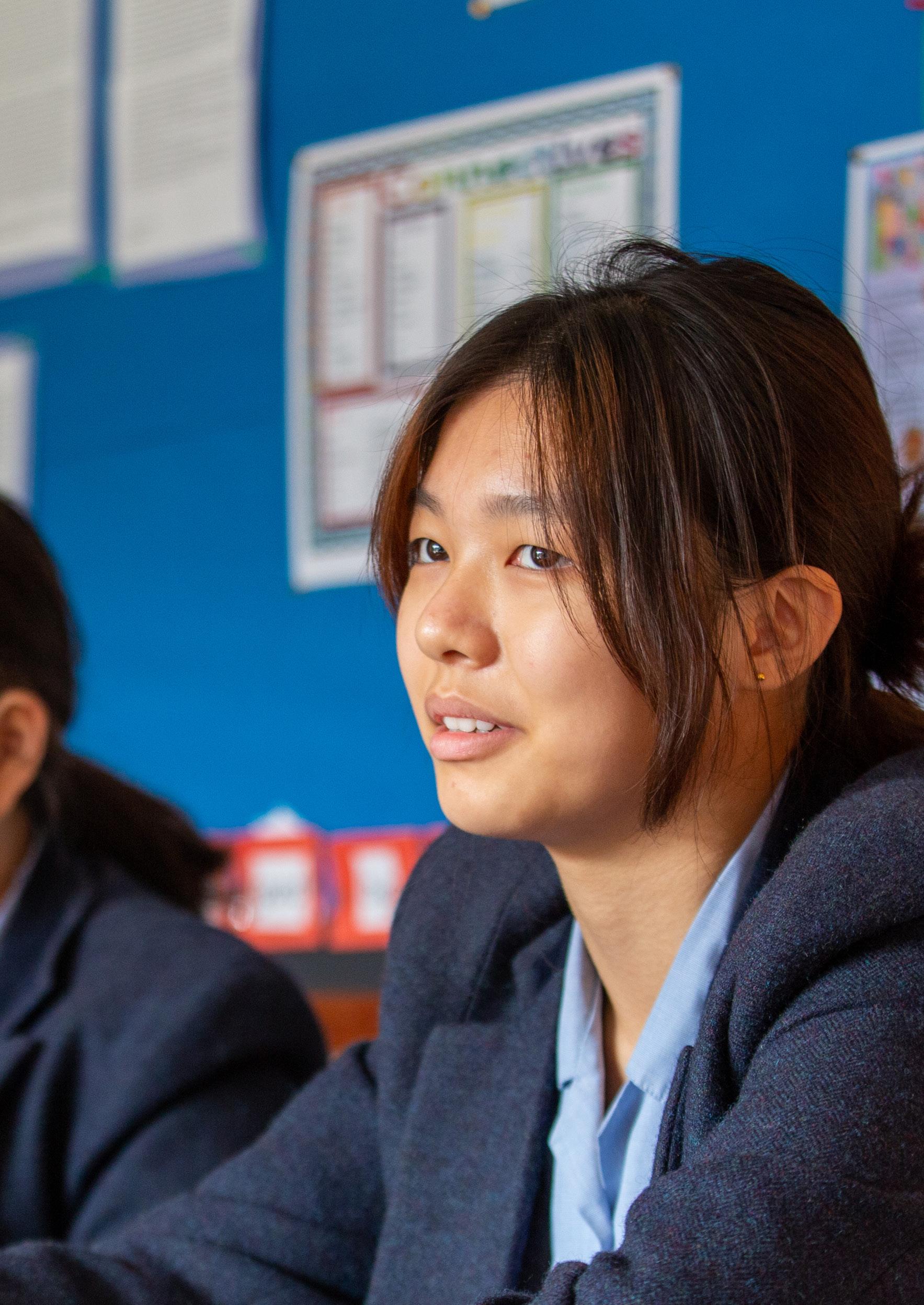
In this year we focus on the skills required to record information in different ways and to produce written assignments across many of the subjects you have chosen for GCSE. These include: active reading skills, making effective notes, summarising, writing and sequencing structured paragraphs and planning essays. Some GCSE subjects also require significant independent work and organisation skills which we can help you develop as well.
As required, we will also show you how to use different strategies to help with understanding and learning of new concepts and information. As we approach the end of year exams, we will look at revision and exam techniques. You can also have help with Maths but at this stage it is important that you start to identify for yourself where you need the help so we will encourage you to bring work with you to the lesson.
Lessons are either individual or in a small group and are scheduled either at 8am, period 9, extra English/Maths or during the study periods. There will be an additional charge for these lessons.
The Extra Maths lesson each week allows time for pupils to become more comfortable and confident with the skills they are learning in their normal class, typically Set 4. These lessons provides an opportunity for pupils to seek clarification on a particular point, gain help with the assignment that they have been set that week, or seek help with revision of a previous topic. Lessons are steered wholly by the needs of the individuals within class - at any point each pupil may be undertaking a different task to the other pupils, supported by their teacher.
As the GCSE exam approaches pupils will spend more time in the Extra Maths class working through problems frm past papers.
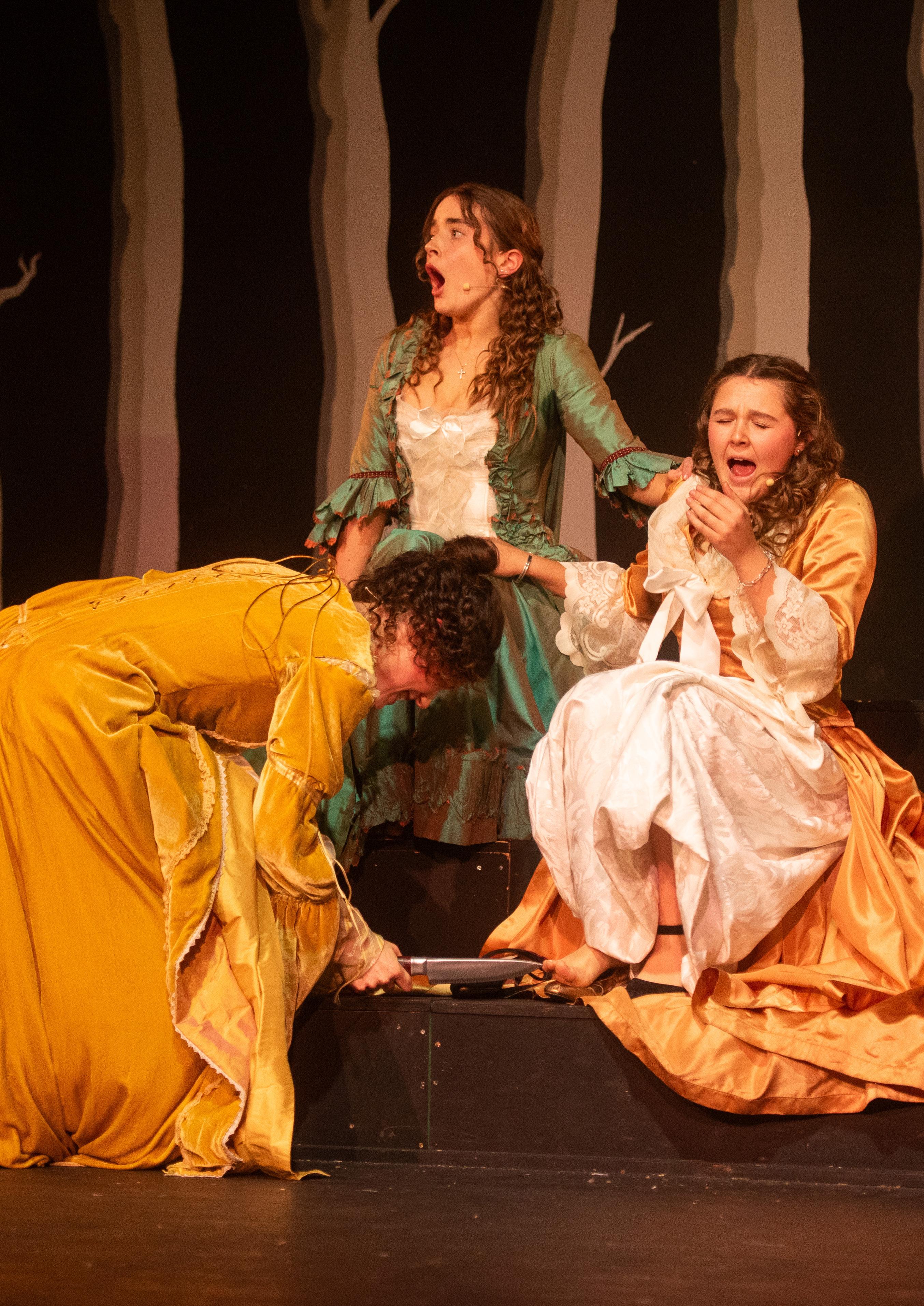
Monkton is deeply committed to fostering a community where exceptional talent, ambition, and dedication are not just recognised, but are actively nurtured and celebrated.
Our scholarship programme identifies and supports students who demonstrate outstanding potential in academics, arts, sports, and leadership. Scholars receive a discount on fees, but much more importantly access our Excellence Programme, offering mentorship, masterclasses and tailored trips to pursue their chosen discipline to the next levl.
Our scholars are encouraged to challenge themselves, to explore new horizons, but also to make a positive impact to the school community by their passion for learning and their character.
We are proud of the achievements of our past scholars, who have gone on to excel in various fields, making significant contributions to society. Their success stories are a testament to the transformative power of education at our school.
To find out more, please contact the Admissions team.
“I have reached the point where telling stories through dramatic and creative arts is the BEST thing I can do at Monkton. It’s addictive in all the best ways because people from every background and age come together to create a team with the one goal to convey a message to the audience: to take them somewhere they don’t even know they want to go yet.
Scholars receive mentorship, masterclasses and tailored programmes.
We offer a number of means-tested bursaries each year to support students who would not otherwise be able to access Monkton, with particular priority given to the children of clergy and missionaries.
We are also proud to support our military families with a substantial discount (CEA +10%) as we know full well how vital a stable, caring boarding community is for military children.
Please see our website for more details and please let Admissions know at the earliest opportunity if you would like to apply for a bursary.
Study Leave begins - students are able to study in school workshops and gain ongoing support from teachers Examinations
Use PSHE Association Thematic Model to develop financial awareness and careers development
Complete a careers questionnaire and refine CV and interview preparation
‘writing your application’ Seminar
Apply for Sixth Form student leadership team roles-prefect, CU, head of house...
Year 12 students attend the University conference in Bristol
Become a Sixth Form Academic Mentor and subject ambassador, tutoring younger students and helping supervise the library
Careers and Networking Event
able to study workshops teachers
Consider A level preferences in discussion with parents, tutor, teachers & house parents
Submit your informed A level choices
Monkton’s Sixth Form Open Evening - Parents attend seminars in which to learn more many A level courses on offer at Monkton
Attend Year 12 Futures Day
Year 13 mock examinations and study leave week in preparation for A level exams
Year 12 Mid Term Assessment
Parent and pupils attend the ‘Introduction to Higher Education’ Evening
Year 11 Mid Term Assessments
Consider the format of GCSE examinations and hone revision techniques
Choose six subjects to trail during Monkton’s Sixth Form Taster Day
Begin exploring post 16 courses and pathways in PSHE lessons and tutor meetings
Attend one of the plethora of academic enrichment events offered at Monkton Senior School
Attend an interview with a member of SLT to discuss preparation for GCSEs, A level choices, and future plans.
Learn study skills, finacial literacy and skills profile in PSHE lessons.
Visit us, either at an open morning (see our website for dates)or book an individual tour or taster day.
Register with our Admissions department.
We will then ask you to sit an online cognitive abilities test and have an interview with one of our senior leadership team.
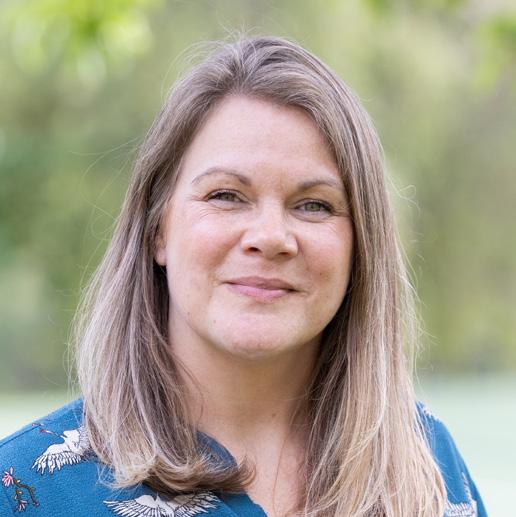
HANNAH PREECE
International
+44(0)1225 721133 preeceh@monkton.org.uk
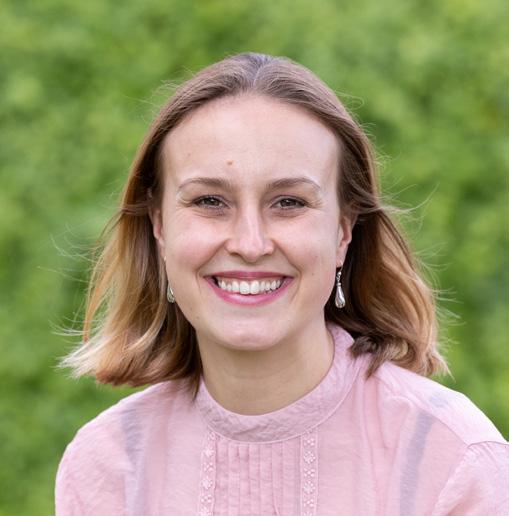
ALEX GRANT-TALBOT
Admissions (Senior)
+44(0)1225 721133 grant-talbota@monkton.org.uk
We will contact you as soon as possible with the outcome, and hope to offer you a place to join us at Monkton
Please get in touch with our admissions team as soon as possible to find out more, as places for Year 10 entry are limited.
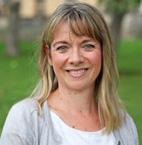
KLOSTERHALFEN
Visits and Enquiries
+44(0)1225 721133 klosterhalfena@monkton. org.uk
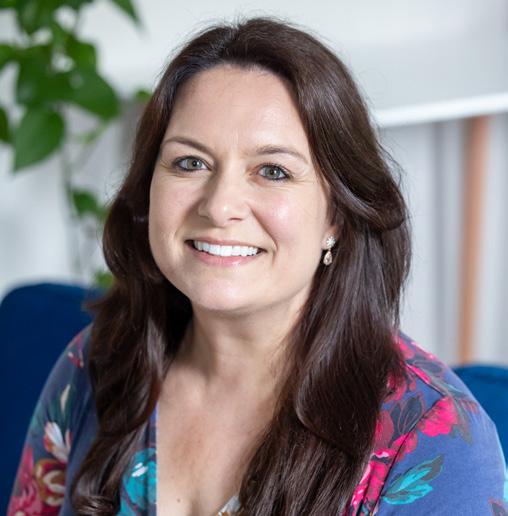
Head of Admissions
+44(0)1225 721133 symondse@monkton.org.uk


Heathrow Airport under 2 hours away
Bristol Airport under 45 minutes

